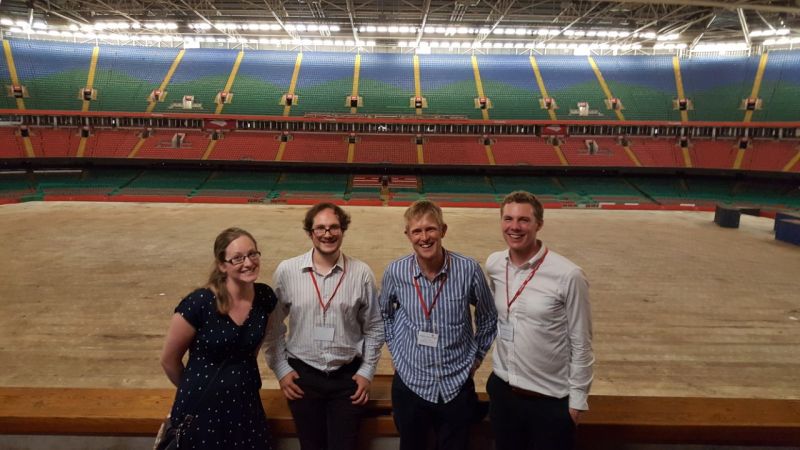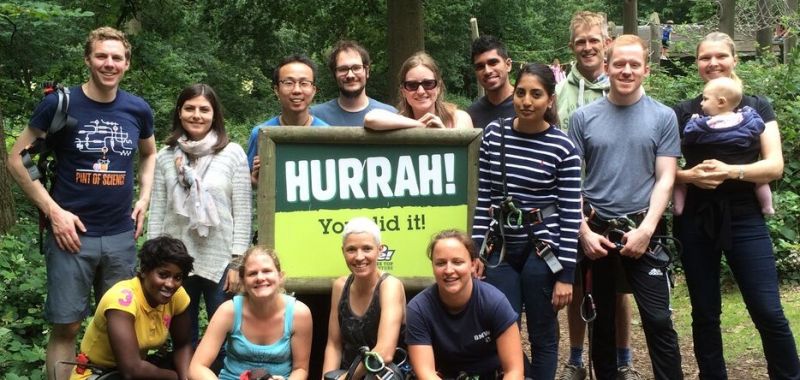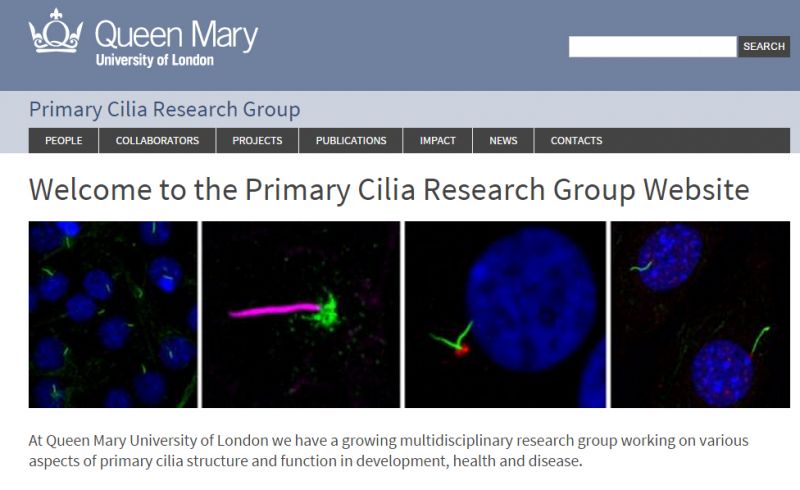Prof Martin Knight
BEng, MSc, PhD, FHEA
News
May 2025 | ||
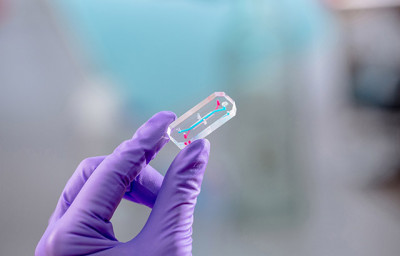 Queen Mary scientists achieve micro-scale breakthrough with big promise14 May 2025Bioengineers at Queen Mary University of London have made a major advance in creating lab-based models that closely mimic the complexity of living human organs - offering a promising alternative to animal testing. The team develops organ-on-a-chip technology, where human cells are cultured inside tiny plastic devices designed to replicate … [more] | ||
February 2025 | ||
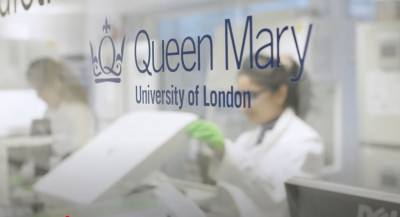 One of Europe's largest organ-on-a-chip facilities opens at Queen Mary University of London24 February 2025Queen Mary University of London has officially opened one of Europe’s largest and most advanced organ-on-a-chip facilities, a groundbreaking development in the quest to replace animal testing in scientific research. The facility is supported by major funding from the National Centre for the Replacement, Refinement and Reduction of … [more] | ||
October 2024 | ||
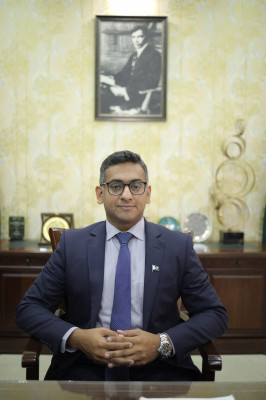 Queen Mary Materials Science graduate to lead Pakistani University17 October 2024Professor Dr Aqif Anwar Chaudhry has recently become the Vice Chancellor of the University of Education, in Lahore, Pakistan. Aqif started his research career at the Department of Materials at Queen Mary University of London (QMUL) as a PhD student. Professor Chaudhry’s PhD, on 'Continuous Hydrothermal Flow Synthesis … [more] | ||
September 2024 | ||
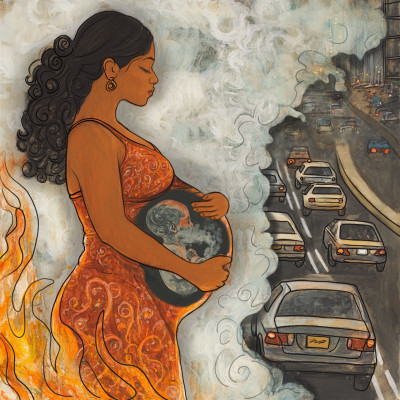 Queen Mary researchers announce clinical trial into air pollution and pregnancy26 September 2024The unseen dangers in the air Babies in the womb are threatened by harmful and hidden particulates from vehicle fumes and industry according to unpublished research from Queen Mary University of London presented at the BioMedEng24 conference on Thursday 5 September 2024. Images shown at the conference show specks of black pollutants … [more] | ||
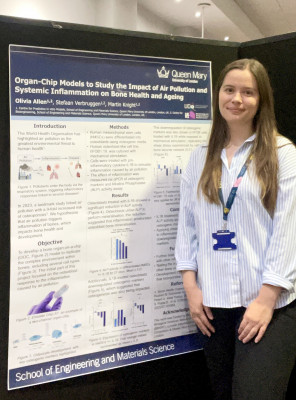 Queen Mary PhD student publishes review paper on the emerging link between air pollution and osteoporosis24 September 2024Olivia Allen, a PhD student in Prof Martin Knight's group in the Centre for Predictive in vitro Models, has published a review paper entitled 'Air Pollution and Osteoporosis' in the leading journal Current Osteoporosis Reports, highlighting the emerging link between air pollutants and bone degeneration. Olivia is just starting … [more] | ||
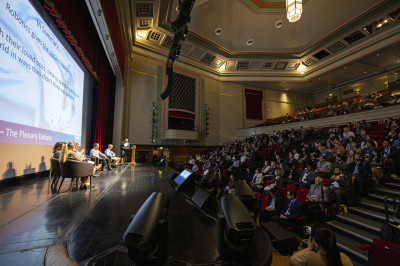 Queen Mary hosts over 400 delegates at BioMedEng2418 September 2024On Thursday 5 and Friday 6 September, Queen Mary University of London proudly hosted BioMedEng24, the 16th annual conference bringing together experts from across the Biomedical Engineering industry in the UK and internationally. This year, more than 430 delegates attended and the programme featured over 30 sessions and more than 240 poster presentations were displayed. 56% … [more] | ||
August 2024 | ||
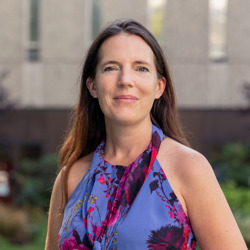 Queen Mary brings together national multi-disciplinary leaders at BioMedEng2412 August 2024On the 5th and 6th of September this year, Queen Mary University of London’s School of Engineering and Materials Science will host the 16th BioMedEng conference, welcoming over 400 Biomedical engineers, researchers, clinical specialists, government and industry representatives. The BioMedEng annual conference is the UK’s largest gathering … [more] | ||
July 2024 | ||
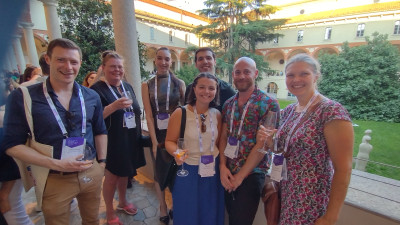 Queen Mary researchers present at the European Organ-on-Chip Society Conference5 July 2024It was great to see so much organ-chip research and development brought together at the EUROoCS conference in Milan. Queen Mary was well represented with multiple talks and posters from our bioengineers. This included work on artery, tendon, cartilage, synovium, bone, and cancer models as well as a talk from … [more] | ||
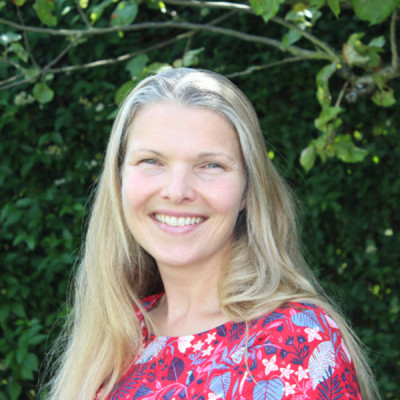 Two Queen Mary bioengineers appointed to the government’s Animals in Science Committee2 July 2024Prof Hazel Screen, Head of the School of Engineering and Materials Science and Professor of Biomedical Engineering, along with Prof Martin Knight, Faculty Dean for Research and Professor of Mechanobiology, have been appointed to the government’s Animals in Science Committee (ASC). The pair have been appointed in a … [more] | ||
We are hiring for an Organ-chip Research Technician1 July 2024Professor Knight and Professor Screen are currently advertising for a hard-working research technician with excellent organizational skills and practical expertise in cell culture and related laboratory techniques to help run our organ-chip facility. The successful candidate will work closely with our researcher team and other technicians, supporting experiments, training users … [more] | ||
May 2024 | ||
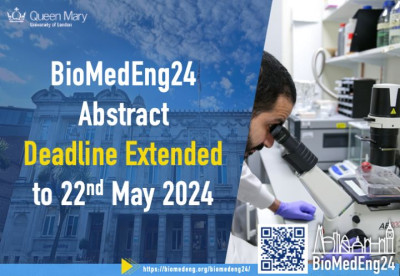 BioMedEng24: Abstract deadline extended to 22nd May1 May 2024BioMedEng24 is pleased to announce an extension to the deadline for abstract submission. New Deadline for Submission: 22nd May 2024 Don't miss your chance to showcase your innovative work at this leading biomedical engineering conference. Ensure you submit your abstract by the new deadline to secure your spot. Please visit: … [more] | ||
April 2024 | ||
 Prof Knight contributes to organ-chip panel at Target to Patient conference29 April 2024Prof Knight gave an invited lecture and sat on an organ-chip discussion panel at the excellent 'Target to Patient 2024' Conference. Prof Knight was part of the session on 'Novel tools and approaches in complex in vitro cellular models' and shared the panel with Dr Lorna Ewart from Emulate Inc and … [more] | ||
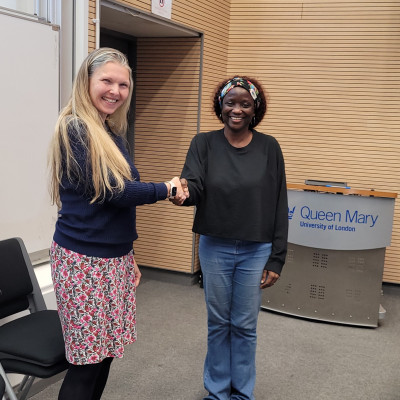 SEMS holds 7th Russell Binions PhD Symposium25 April 2024The 7th annual Russell Binions Memorial PhD Symposium took place on Thursday 25th April at the School of Engineering and Materials Science. Each year, The Symposium provides an opportunity for our PhD students and Postdoctoral Research Assistants to formally present their work to their peers and academics in the School. … [more] | ||
March 2024 | ||
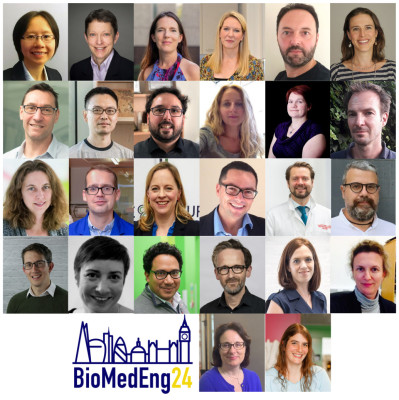 BioMedEng24 Abstract Submission31 March 2024The next Biomedical Engineering Association’s annual conference, BioMedEng24, will be organised by Queen Mary University of London, taking place on 5-6 September 2024. Expect to explore plenary sessions, keynote talks, break-out workshops, poster sessions, dedicated early-career researcher sessions and more. Abstract Submission Leaders from academia, industry, clinicians, early-career researchers … [more] | ||
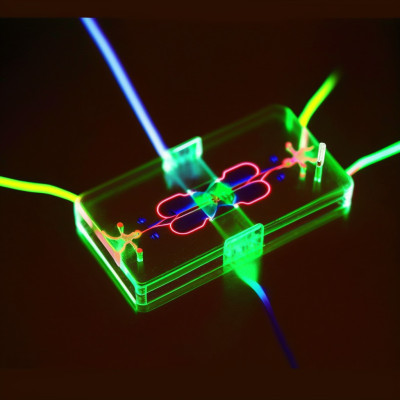 Queen Mary team awarded £7 million grant to train next generation of organ-on-a-chip scientists13 March 2024A team of bioengineers led by Professor Hazel Screen have been awarded a £7 million grant to establish an EPSRC Centre for Doctoral Training (CDT) in Next Generation Organ-on-a-Chip Technologies. Queen Mary University of London is one of 65 universities chosen to receive funding from the Engineering and Physical Sciences Research … [more] | ||
January 2024 | ||
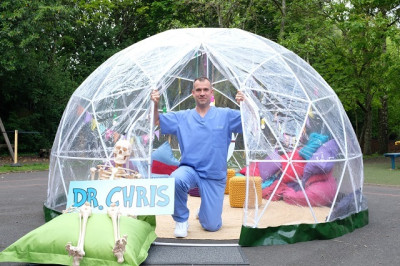 Q&A with Professor Hazel Screen: From bones to organ-chips on Operation Ouch!19 January 2024Professor Hazel Screen of the School of Engineering and Materials Science recently took on a new challenge: explaining the fascinating world of organ-chip technology to the young audience of Operation Ouch! In this Q&A, we delve into Professor Screen's research, her experience on the show and why … [more] | ||
December 2023 | ||
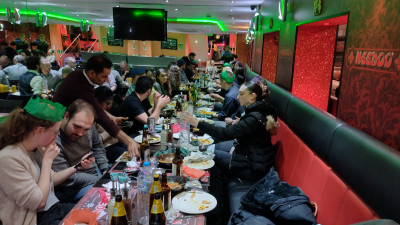 Group Festivities!6 December 2023Our research group enjoyed an a Christmas Curry and a chance to all catch up socially. | ||
November 2023 | ||
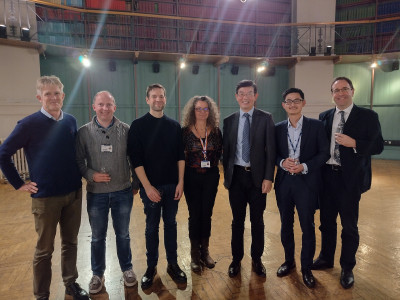 SEMS team recognised at QMUL Academic Promotions Event21 November 2023On 21st November QMUL hosted an event to celebrate the staff who have been promoted in the most recent academic promotion rounds. As we reported back in September, this was a very successful outcome for SEMS with 12 of our colleagues being promoted across all the different academic grades, reflecting the … [more] | ||
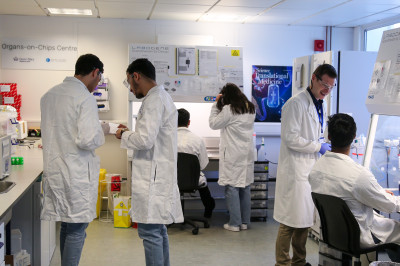 Researchers make discovery that could prevent the spread of breast and prostate cancer to bones16 November 2023Queen Mary researchers have helped to discover a new molecular mechanism in osteocyte cells, that explains how cancer hijacks bone cells in order to grow. A new paper published in Advanced Science outlines findings by Dr Stefaan Verbruggen, Lecturer in Medical Technology, and his research group. The interaction between bone … [more] | ||
October 2023 | ||
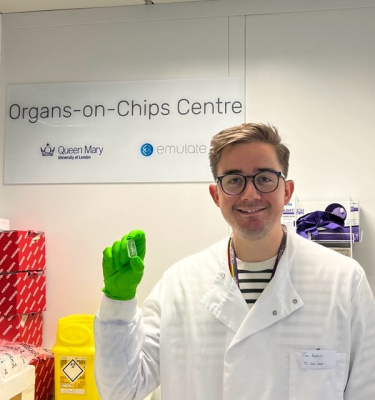 New organ-on-a-chip model of human synovium could accelerate development of treatments for arthritis12 October 2023Researchers at Queen Mary University of London have developed a new organ-on-a-chip model of the human synovium, a membrane-like tissue that lines the joints. The model, published in the journal Biomedical Materials, could help researchers better understand the mechanisms of arthritis and develop new treatments for this group of debilitating … [more] | ||
 Successful EU Doctoral Network grant - new organ-chip mechanobiology PhD available in Knight group11 October 2023Prof Martin Knight is part of a recently successful Horizon Europe Marie Skłodowska-Curie and UKRI funded Doctoral Network (MSCA DN) entitled “SurfEx”: Epithelial Exchange Surfaces – From organising principles to novel culture models of the gatekeepers of the body. We are now advertising a new PhD studentship … [more] | ||
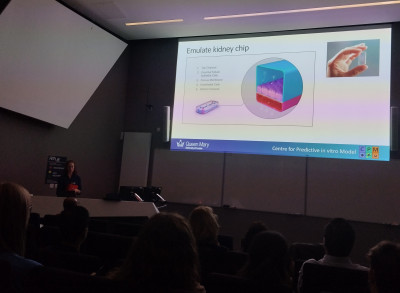 Great science at the UK Cilia Network meeting6 October 2023Excellent cilia science at the annual UK Cilia Network meeting in Edinburgh. Beth from the Knight group gave a great presentation on her PhD project developing an organ-chip to study the impact of cilia modifications on mechanosignalling in the kidney and implications for development of new therapies for polycystic kidney … [more] | ||
September 2023 | ||
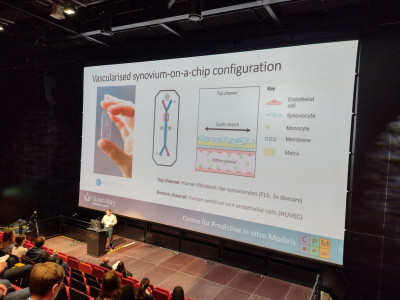 Knight group present organ-chip research at the BioMedEng conference15 September 2023The research group enjoyed the excellent BioMedEng conference in Swansea and contributed lots of great talks on our organ-chip work here at Queen Mary and the Centre for Predictive in vitro Models. Dr Tim Hopkins presented his research on the development of both a vascularised synovium organ-chip and a growth-plate … [more] | ||
July 2023 | ||
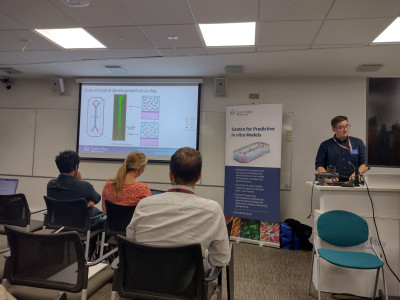 Organ-chip research presented at Centre for Predictive in vitro Models Workshop18 July 2023Dr Tim Hopkins gave an excellent presentation of some of the work in the Knight group, developing organ-chip models of bone, cartilage and synovium. The presentation was part of a workshop held by the Centre for Predictive in vitro Models to showcase the variety of organ-chip and other in vitro … [more] | ||
June 2023 | ||
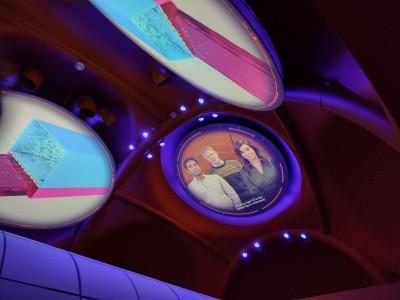 Organ-chip bioengineers featured in new science education centre13 June 2023Great to see the launch of the new Centre Of The Cell pod featuring some of our organ-on-a-chip bioengineering researchers. The Centre of the Cell is an award winning, inspiring children's science education centre at Queen Mary. Our organ-on-a-chip research is also being featured in some of the live … [more] | ||
May 2023 | ||
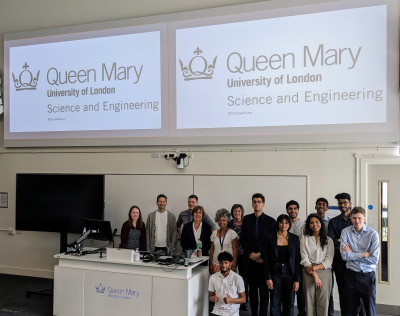 Intercalated Symposium - Celebrating 8 Years30 May 2023Opportunities in STEMM Medical students presented research alongside leading scientists and engineers from the Centre of Bioengineering. Presentations covered multiple disciplines in machine learning, cardiovascular disease, orthopaedics, gastroenterology, cancer, medical robotics, fetal medicine and environmental health. In particular, understanding how exposure to harmful pollutants in air, water or soil affects … [more] | ||
March 2023 | ||
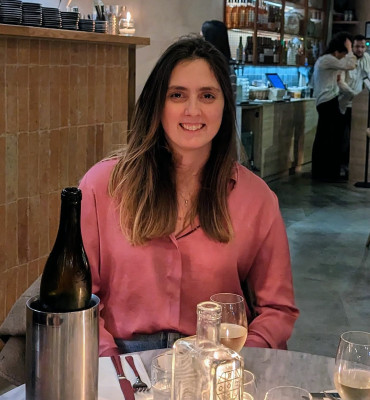 Congratulations to Marta Beja Ferreira who passed her PhD viva on using artificial intelligence to provide diagnostic markers for breast cancer20 March 2023Breast cancer is the most common cancer type that affects women and although several therapy improvements have been made in the last decades, it is still estimated that nearly 11,400 women die each year of this type of cancer in the United Kingdom alone. At early stages of the disease the … [more] | ||
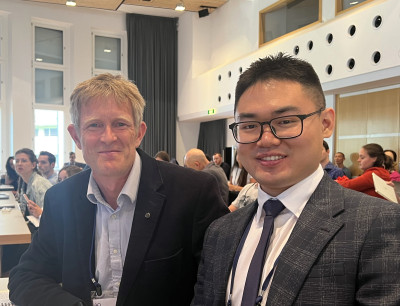 Congratulations to Huan Meng who passed his PhD on mechanical regulation of cartilage inflammation13 March 2023Huan's thesis examined the effect of the mechanical environment on inflammation that occurs in articular cartilage associated with joint disease such as osteoarthritis. In particular, the research examined the role of a complex signalling mechanism (termed YAP-signalling) that occurs within the cartilage cells and the involvement of specialised … [more] | ||
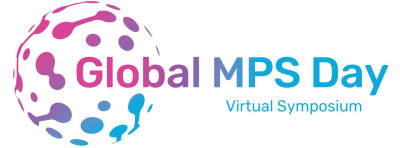 QM Bioengineers present at the Global MicroPhysiological Systems Day8 March 2023To celebrate all the amazing work being done with Organ-Chips and other microphysiological systems (MPS) in drug discovery and development, the Global MPS Day virtual symposium on March 9th 2023 is packed with presentations from the industry’s top experts and thought leaders. These internationally leading experts including Profs Robert … [more] | ||
January 2023 | ||
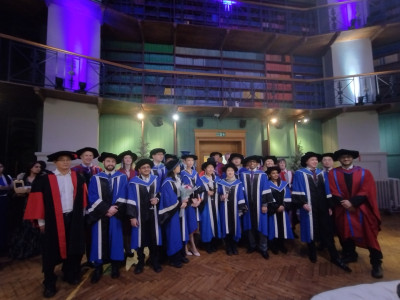 Megan McFie graduates with her PhD6 January 2023It was great to celebrate with Meg and others who graduated with PhDs from the School of Engineering and Materials Science. Meg's PhD involved conducting a confocal microscopy screen of 1700 drugs to identify compounds that regulate the length of the specialist cellular organelles known as primary cilia. The information is … [more] | ||
November 2022 | ||
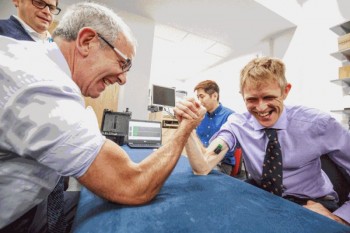 Dan Bader27 November 2022It was with great saddness that I heard of the death of Prof Dan Bader on 5th November 2022. Dan was my PhD supervisor and a trusted mentor and friend. At Dan's funeral, I was honoured to be able to say a few words about Dan's academic career and … [more] | ||
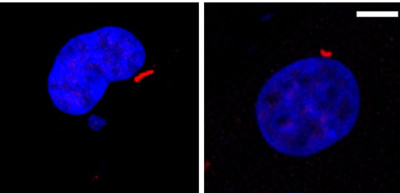 New research shows how cartilage degradation can be prevented by pharmaceutical regulation of YAP/TAZ26 November 2022New research has shown how cartilage inflammation, as occurs in conditions such as osteoarthritis, can be prevented by activation of the YAP/TAZ cellular pathway. The work was led by Huan Meng, a PhD student in Prof Martin Knight's group and was published in the journal 'Osteoarthritis and Cartilage': '… [more] | ||
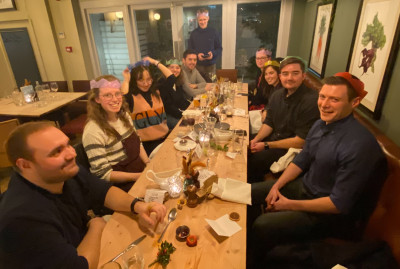 Knight Group Christmas Party!25 November 2022 | ||
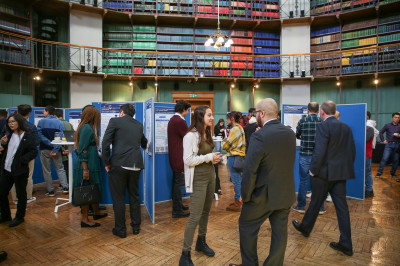 Organ-chip researchers win award at Industrial Liaison Forum21 November 2022Congratulations to Dr Clare Thompson (Queen Mary+Emulate Centre Scientist), Dr Joanne Nolan (CRUK-EPSRC post doc) and Dr Tim Hopkins (Versus Arthritis Research Fellow), who together won the award for best research presentation at the Industrial Liaison Forum organised by the School of Engineering and Materials Science. All three are … [more] | ||
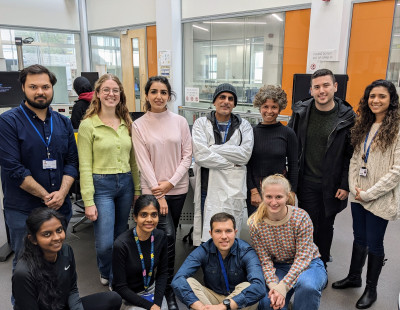 National Engineering Week2 November 2022Celebrating This is Engineering This is Engineering returned today as National Engineering Week to celebrate the engineers and show how engineering improve lives. We marked the event by inviting undergraduate, Intercalated and MSc students to meet the engineers and celebrate all things STEMM. Engineers improve lives Around 100 students worked … [more] | ||
October 2022 | ||
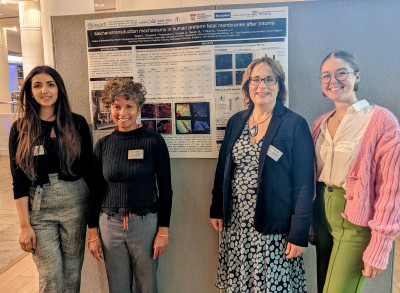 Rosetrees Trust celebrates 35 years at the Royal Society of Medicine11 October 2022Rosetrees Trust supports interdisciplinary research Rosetrees Trust is a unique medical charity working to advance interdisciplinary research in science, engineering and medicine. The charity has been funding exciting research projects to develop healthcare solutions that benefit patients and improve the lives of communities and society. After supporting 35 years of … [more] | ||
August 2022 | ||
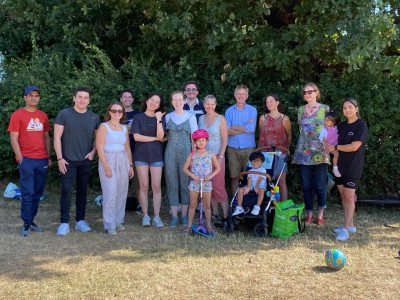 Research Group Summer Picnic8 August 2022We enjoyed our annual research group summer picnic and an excellent game of rounders. | ||
July 2022 | ||
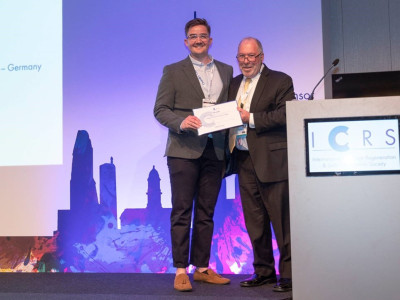 Dr Timothy Hopkins receives Versus Arthritis Foundation Fellowship29 July 2022Dr Timothy Hopkins has been awarded a £310,000 Foundation Fellowship by Versus Arthritis to develop a human ‘joint-on-a-chip’. The aim of the fellowship is to improve understanding of how interactions between knee joint tissues contribute to the development of osteoarthritis (OA), and to the efficacy of treatments. OA … [more] | ||
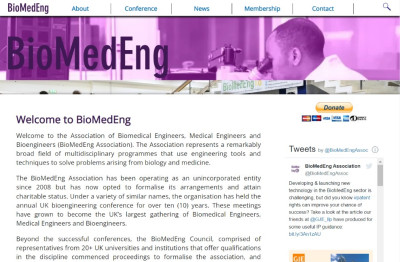 Prof Martin Knight elected as the first Chair of the UK BioMedical Engineering Council6 July 2022Prof Martin Knight from the School of Engineering and Materials Science at Queen Mary University of London (QMUL) has been elected as the first Chair of the UK BioMedEng Council. The Association of Biomedical Engineers, Medical Engineers and Bioengineers (BioMedEng Association) represents a broad field of multidisciplinary research … [more] | ||
June 2022 | ||
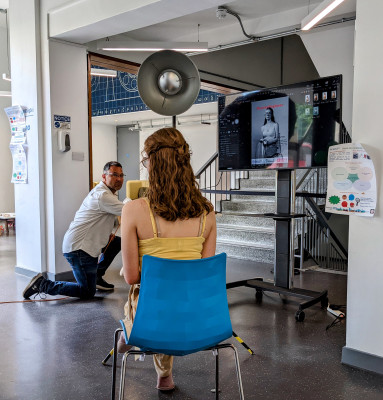 International Women in Engineering Day23 June 2022Celebrating women engineers and helping each other see our lives For years we have been celebrating the achievements of our engineers but today we wanted to do something different. We wanted to help others see who we are, help us reflect on our past and see … [more] | ||
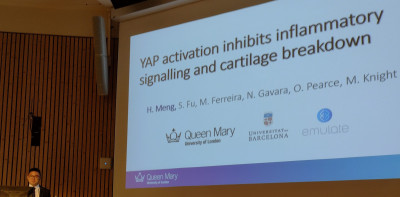 Knight group presentations at the eCM20: Cartilage and Disc Repair and Regeneration Conference19 June 2022The Knight group was well represented at the 2022 eCM20: Cartilage and Disc Repair and Regeneration Conference in Switzerland. Two of our PhD students, Huan and Dariel, gave excellent oral presentations at the meeting prompting lots of questions and discussion. Huan presented his work demonstrting the anti-inflammatory effects of … [more] | ||
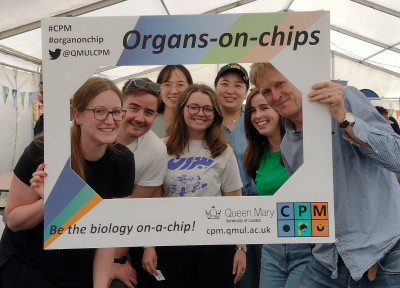 Inspiring the next generation of organ-chip scientists and bioengineers at the QMUL Festival of Communities11 June 2022A fantastic day at Queen Mary's Festival of Communities talking about our organs-on-chips research. There was lots of interesting conversations and interactions with local people of all ages. Our excellent team of demonstrators showed people real organ-chip models and discussed their usage in the development of new medicines. Visitors, … [more] | ||
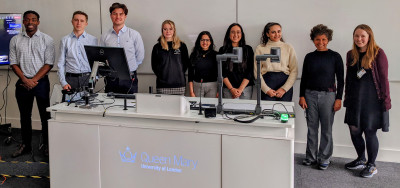 Congratulations to the 2022 Intercalated Graduates1 June 2022Celebrating seven years of the Intercalated Research Symposium The Intercalated Symposium is an exciting scientific forum for medical students to present collaborative multi-disciplinary research in science, engineering and medicine. Around 60 participants joined the 2 sessions with presentations in machine learning, computational medicine, medical robotics, healthcare, nanotechnology, biomaterials and regenerative … [more] | ||
May 2022 | ||
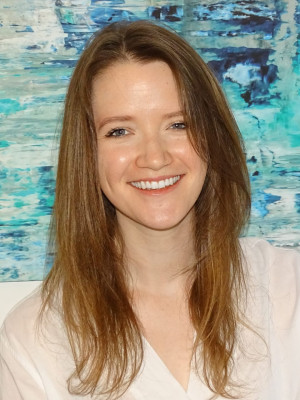 Congratulations to Megan McFie who has passed her PhD identifying drugs that regulate primary cilia in cartilage cells24 May 2022Megan has successfully completed her PhD which examined the effect of pharmaceutical compounds on primary cilia - solitary hair-like structures found on most cell type. Her PhD was part of a multidisciplinary collaboration between Prof Martin Knight and Dr Cleo Bishop. Primary cilia are known to coordinate a variety of … [more] | ||
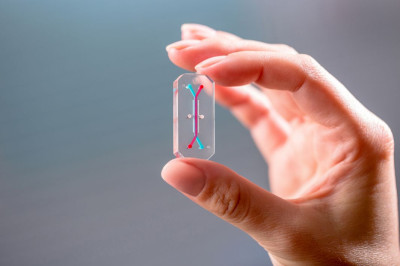 Researchers at QMUL discuss the future of organ-on-a-chip models in new 'What is Biotechnology' article6 May 2022Prof Knight was interviewed, along with Prof Donald Ingber from the Weiss Institute and other leading figures working in the organ-on-a-chip technology, for a major new review article pubishished in 'What is biotechnology'. As the review explains, organs-on-a-chip are small devices designed to replicate key aspects of the physiological … [more] | ||
February 2022 | ||
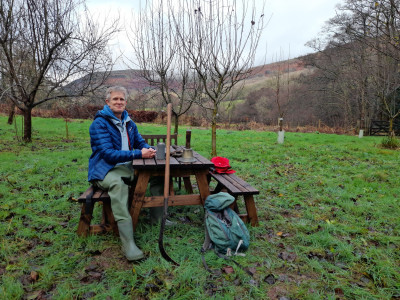 25 Years of Service at Queen Mary for Prof Martin Knight16 February 2022Professor Knight writes: "I have officially been recognised as providing service to Queen Mary for 25 years! This goes back to my post doc years holding an EPSRC Advanced Research Fellowship based in the Interdisciplinary Research Centre (IRC) in Biomedical Materials. "It has been a pleasure and a privaledge … [more] | ||
January 2022 | ||
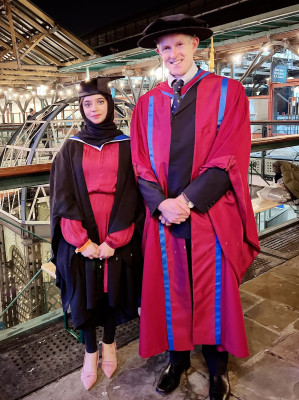 Fantastic Graduation20 January 2022It was fantastic to celebrate graduation with our students. | ||
November 2021 | ||
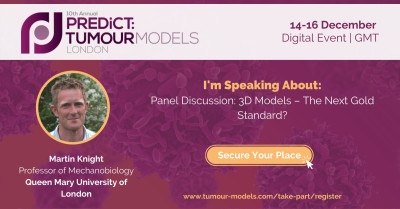 Prof Knight on expert panel on organ-chip models for cancer17 November 2021Prof Knight is excited to be speaking on an expert panel at the upcoming 10th PREDiCT: Tumour Models London Summit which is uniting preclinical and translational leaders to narrow the preclinical gap and progress efficacious candidates to the clinic. He will be presenting on 'Organ-on-a-chip Models of Bone Metastasis' and … [more] | ||
July 2021 | ||
 Prof Knight on expert panel discussing the use of animals in science5 July 2021Prof Martin Knight was part of an expert panel at the 'lead the debate' event organised by the Royal Society for the Prevention of Cruelty to Animals (RSPCA). The event was the second in the series, which aims to convene small groups of thought leaders on prominent topics affecting … [more] | ||
June 2021 | ||
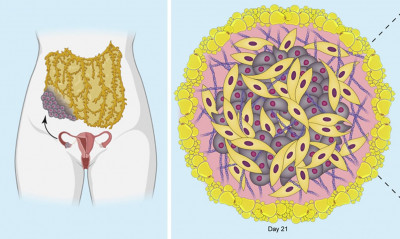 Two new papers on multi-cellular in vitro models of ovarian cancer published in iScience23 June 2021We have recently published two new papers in the journal iScience, which describe the development of novel multi-cellular in vitro models of ovarian cancer and the use of these models to better understand this disease. The work stems from a major European Research Council grant, CANBUILD, which was led … [more] | ||
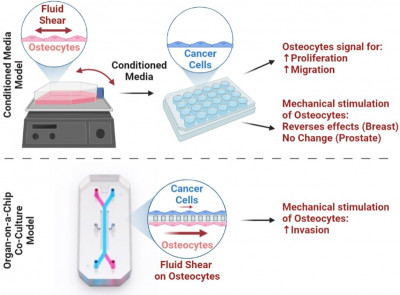 New organ-on-a-chip study demonstrates how physical exercise regulates bone metastasis in breast and prostate cancer17 June 2021Bioengineers at Queen Mary publish a new study in the journal Cancers which demonstrates the significant impact of physiological mechanical loading on bone metastasis in breast and prostate cancer. The paper describes a new organ-chip model of bone metastasis which incorporates cancer cells and bone cells in … [more] | ||
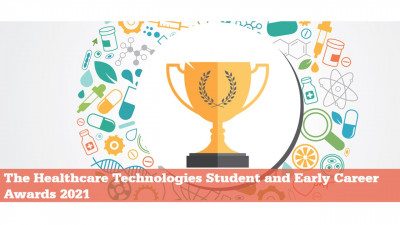 QM student wins IMechE prize for the best Bioengineering undergraduate project16 June 2021Congratulations to Eisha Hashmi who was selected for the IMechE Vicon Award for the best Bioengineering undergraduate project. Eisha presented her 3rd year individual research project at the Healthcare Technologies Student and Early Career Awards event held by Institute of Mechanical Engineers (IMechE) and was awared the … [more] | ||
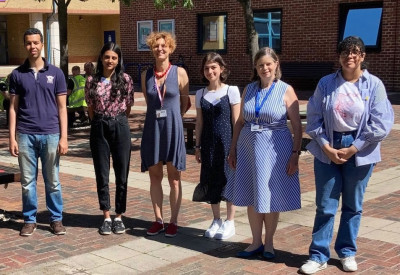 Science & Engineering Summer Research Internships for BAME Undergraduate Students in SEMS14 June 2021As part of the Science & Engineering Faculty’s mission to transfer horizons for all students, the School Management Team are delighted to report that SEMS have won four S&E Summer Research Internships for BAME Undergraduate Students. Following a rigorous selection process examining the quality of the … [more] | ||
April 2021 | ||
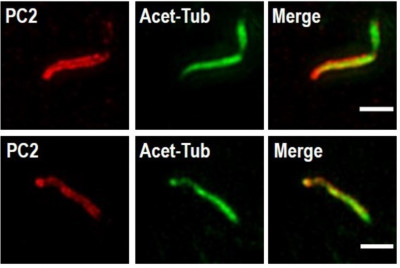 New paper on cilia mechanosignalling and polycystin21 April 2021Congratulations to Dr Clare Thompson who has published a new paper on the role of polycystin in chondrocyte mechanotransduction. The study published in the International Journal of Molecular Science in a special issue on Mechanobiology of Organelles. In the paper we subjected isolated chondrocytes to mechanical stimulation and … [more] | ||
March 2021 | ||
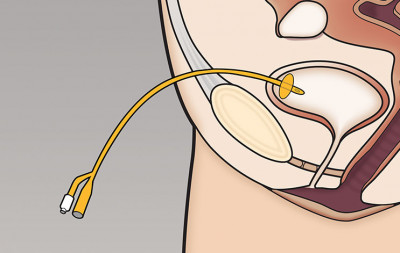 Intercalated student gives symposium on her research project at Royal National Orthopaedic Hospital.22 March 2021Congratulations to Elisha Koonjul, who gave an excellent symposium presentation on her iBSc research project to clinicians at the Royal National Orthopaedic Hospital (RNOH). Elisha's project investigates the effect of catheter clamping on the capacity and biomechanics of urinary bladder in patients with a spinal cord injury. This technique … [more] | ||
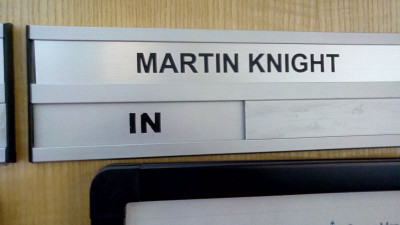 Great to be back on campus!19 March 2021Great to return to the campus last week and see some of the research team. So nice to see people in person after a year on Microsoft Teams! I toured the new PhD shared study space, which looks fantastic and a great improvement. Also nice to see the new ground … [more] | ||
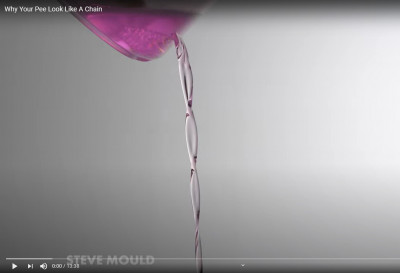 YouTube video on Prof Knight's paper on the urine stream set to go viral11 March 2021Steve Mould, the famous science communicator and YouTuber, has just produced a new video on the physics behind the shape of the urine stream. Steve explains that there is very little published literature on this phenomenum but he describes one key paper ... ... In 2012 Prof Knight and colleagues published a paper … [more] | ||
February 2021 | ||
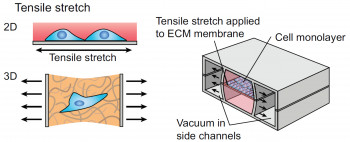 Knight's group publish new paper on the importance of mechanical stimulation in organ-chip technology24 February 2021Prof Knight and colleagues at Queen Mary University of London and University College Dublin have published a new paper discussing the importance of incorporating mechanical stimulation into organ-on-a-chip technology. Prof Knight will be discussing this work at the forthcoming Pan-London 3Rs Symposium. Organ-chip models consist of living cells grown in … [more] | ||
 Inaugural QMUL Festival of Education Showcases Five SEMS Talks22 February 2021Booking is now open for the Inaugural QMUL Festival of Education (https://www.qmul.ac.uk/queenmaryacademy/festival-of-education-2021/) will take place 8-12th March. Details on the Festival Agenda and how to book places for talks can be found on the SEMS Events pages (https://www.sems.qmul.ac.uk/… [more] | ||
January 2021 | ||
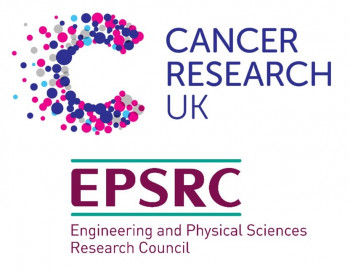 New CRUK/EPSRC research grant: Organ-on-a-chip model to investigate breast cancer bone metastases12 January 2021A new research grant using organ-on-a-chip technology to understand breast cancer bone metastasis has started in Prof Martin Knight's bioengineering and mechanobiology research group. The multidisciplinary award is jointly funded by Cancer Research UK (CR UK) and the Engineering and Physical Sciences Research Council (EPSRC). The project will develop … [more] | ||
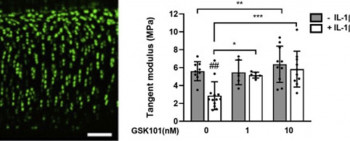 New paper on anti-inflammatory effects of TRPV4 stimulation11 January 2021Prof Knight's research group have published a new study showing, for the first time, the anti-inflammatory effects of stimulating the mechanosensitive ion-channel, TRPV4, and its importance in cartilage health. Degenerative joint conditions, such as osteoarthritis, are associated with pro-inflammatory signalling which causes degradation of the articular cartilage leading to … [more] | ||
December 2020 | ||
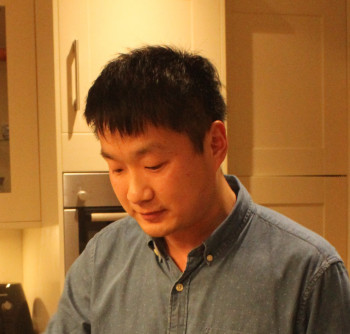 Jinshuai Zhang passed his PhD viva14 December 2020Many congratulations to Jinshuai, who successfully defended his PhD thesis in November, 2020. Jinshuai's thesis is titled "Synthesis and Optoelectronic Study of Geometry-Confined Lead Halide Perovskite Monocrystalline Thin Films". Jinshuai was funded by a CSC-QMUL PhD studentship and was supervised by Dr Lei Su and Prof Martin Knight. During his PhD, … [more] | ||
November 2020 | ||
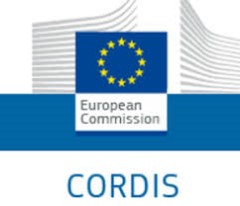 EU Commission report on cancer mechanobiology research from Prof Knight's group at QMUL24 November 2020The EU Commission have published a report on some of the research into cancer mechanobiology taking place in the Bioengineering Division within School of Engineering and Materials Science at QMUL. The report entitled 'Mechanobiology of METAstatic and DORMant cancer cells in bone marrow lesions', describes research conducted by Dr Verbruggen … [more] | ||
October 2020 | ||
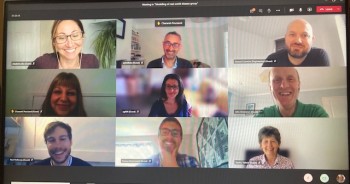 Organ on chip funding sandpit goes virtual5 October 2020Thanks to the new world of on-line events, the OOACT Network's sandpit – originally planned face to face in April this year – was run successfully in MS Teams from 29 September to 1 October. This interactive funding sandpit event provided a great opportunity for 32 senior academics and industrialists from across … [more] | ||
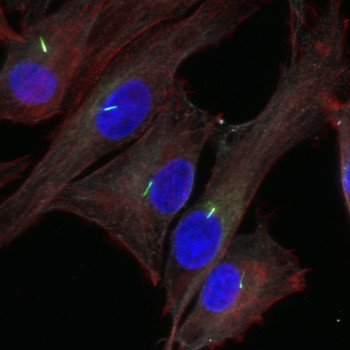 Funding awarded to Prof Knight to develop a new treatment for the rare disease, Jeune Syndrome1 October 2020This project funded by Queen Mary Innovations, will identify compounds for the treatment of a rare genetic disease, Jeune Syndrome, that disrupts skeletal formation. The disease is caused by mutation in the genes that regulate primary cilia – the tiny hair-like cellular structures that coordinate a variety of important signalling … [more] | ||
September 2020 | ||
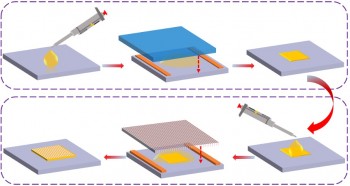 Queen Mary researchers develop non-distructive single-crystal perovskite surface nanopatterning technologies25 September 2020Single-crystalline perovskites are widely regarded as the future semiconductor materials and will be the next big wave in optoelectronics. To manufacture high-quality single-crystal perovskite optoelectronics, non-destructive surface nanopatterning technologies are required. Conventional photolithography-based nanopatterning methods cannot be used due to perovskite’s sensitivity to high temperature and solvents. Researchers at … [more] | ||
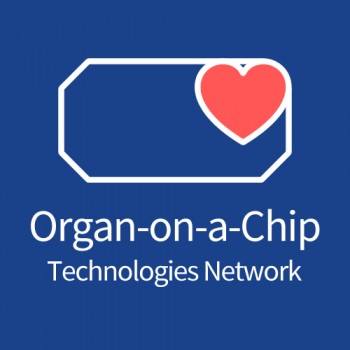 QM hosts new Organ-on-a-chip Research symposia22 September 2020QMUL has launched a new e-symposia series with research presentations related to organ-on-a-chip and other predictive in vitro models. The symposia are part of the UK Organ-on-a-chip Technologies Network which is funded via the Technology Touching Life scheme and directed by Prof Hazel Screen and Prof Martin Knight, both bioengineers … [more] | ||
July 2020 | ||
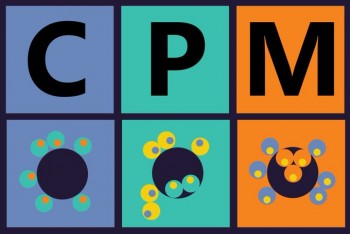 Successful Launch of QMUL Centre for Predictive in vitro Models22 July 2020The Centre for Predictive in vitro Models (CPM) was officially launched on Wednesday 22nd with an successful virtual symposium. More than 330 registrated attendees joined in to celebrate the occasion, listening to talks and participating in stimulating discussions. Introductory words from the vice principal for the faculty of Science and Engineering, … [more] | ||
June 2020 | ||
 Using Organs-on-chips technology to accelerate COVID-19 research18 June 2020The Queen Mary & Emulate Organs-on-Chips Centre is involved in a new initiative to use miniaturised living systems with human cells, known as organ-chips, in the fight against COVID-19. As part of this initiative, Emulate, Inc have donated blank Organ-Chips to the UK Organ-on-a-chip Technologies Network to support the … [more] | ||
May 2020 | ||
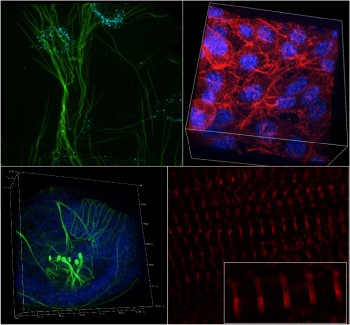 New state-of-the-art microscope to support research in the School of Engineering and Materials Science20 May 2020Queen Mary underlined its strong commitment to the ongoing research in SEMS by investing into a £375K state-of-the-art super-resolution spinning disc microscope. Microscopy imaging approaches have long been a major research strength within the school, facilitating new collaborative links and supporting significant research funding and outputs in leading journals. … [more] | ||
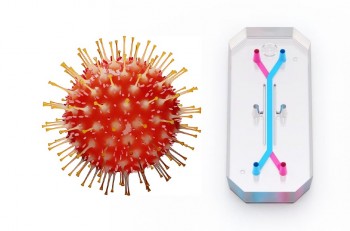 Queen Mary + Emulate Organs-on-Chips Centre supports COVID-19 initiative6 May 2020The Queen Mary + Emulate Organs-on-Chips Centre is supporting a new initiative to use predictive in vitro models, also known as organ-chips, in the fight against COVID-19. Emulate, Inc is participating in the Organs-on-Chips against COVID-19 initiative (#OoCovid) and donating a set of Organ-Chips to the UK Organ-on-a-Chip Technologies Network which … [more] | ||
February 2020 | ||
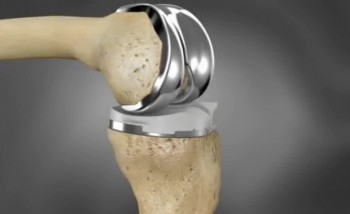 New paper on the anti-inflammatory effects of low levels of cobalt ions3 February 2020Cobalt ions from some orthopaedic implants induce a dose-dependent cytotoxic and pro-inflammatory response. However, this new paper from Prof Knight and Prof Shelton's groups shows that low levels of cobalt are in fact beneficial and block pro-inflammatory signalling in cartilage. The authors showed that sub-toxic levels of cobalt (50uM) … [more] | ||
January 2020 | ||
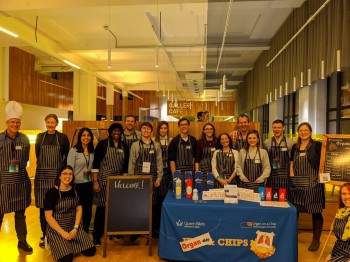 The Organ-on-a-Chip Shop – a Science Museum highlight!29 January 2020On 29 January, Organ-on-a-Chip Technologies Network scientists and engineers swapped their lab coats for aprons, to run the Organ on a Chip shop at the hugely popular Science Museum Lates in London. This Lates night celebrated the launch of the Museum’s new Medicine Galleries and attracted over 4,000 visitors. Promoted … [more] | ||
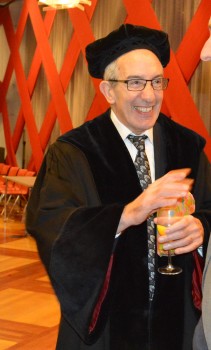 Dan Bader Gives His Valedictory Lecture in Technical University of Eindhoven24 January 2020During his time as Professor of Medical Engineering at Queen Mary University of London, Prof Bader was also a part-time visiting professor in the Technical University of Eindhoven (Tu/E). There he worked closely with Prof Cees Oomens in the area of pressure ulcers as well as continuing his work … [more] | ||
 Queen Mary opens Organs-on-Chips Centre for advancements in medical research and drug development16 January 2020A new research centre which aims to revolutionise medical research and drug development using microengineered Organs-on-Chips has opened at Queen Mary University of London. Organs-on-Chips contain tiny hollow channels lined by living human cells that recreate the microenvironment experienced by cells within the human body. As miniaturised living … [more] | ||
December 2019 | ||
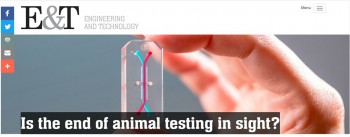 Profs Knight and Screen interviewed for report on organ-on-a-chip13 December 2019Profs Knight and Screen were recently interviewed for a news article on organ-on-a-chip which has just been published in the magazine Engineering & Technology. The article explored the potential of organ-on-a-chip technology for testing the safety and efficacy of new pharmaceuticals and the impact on conventional animal testing. [more] | ||
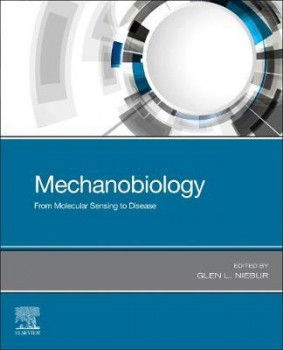 Clare Thompson and Megan McFie publish chapter in new mechanobiology book.6 December 2019Clare Thompson and Megan Mcfie have helped write a chapter on primary cilia mechanobiology in an excellent new book entitled Mechanobiology : From Molecular Sensing to Disease. The chapter reviews the role of primary cilia in mechanosignalling in a variety of tissues and the effect of mechanical forces on cilia structure … [more] | ||
 Organ-on-a-Chip on show at Science Museum Lates4 December 2019Science Museum Lates: Medicine, 18.45 - 22.00, Wednesday 29 January 2020 (over -18s only) Organ on a Chip Shop - a Lates highlight! Organ-on a-Chip Technologies Network members from across the UK will be running the shop at this hugely popular event. Based on the concept of a fish & chip takeaway, this '… [more] | ||
November 2019 | ||
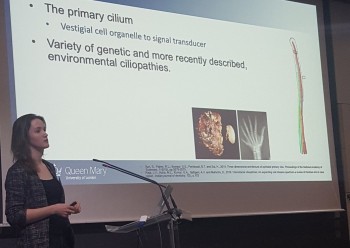 Knight group presentations at the International Cilia & Centrosomes Conference29 November 2019Several members of the Knight group have been at the excellent International Conference on Cilia, Flagella and Centrosomes organised by the French and UK Cilia Networks. On the first day Megan gave a fantastic presentation on her PhD project screening >1700 compounds for effects on primary cilia structure as part … [more] | ||
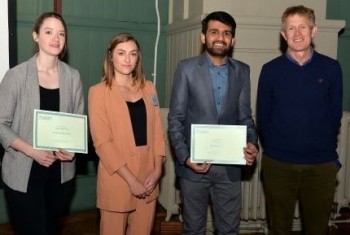 PhD poster prizes to Megan and Hudair21 November 2019Congratulations to Megan and Hudair who both won prizes for their PhD research posters at the Industrial Liaison Forum organised by the School of Engineering and Materials Science. Both Megan and Hudair are part of Knight’s research group. Megan’s PhD is co-supervised by Dr Cleo Bishop … [more] | ||
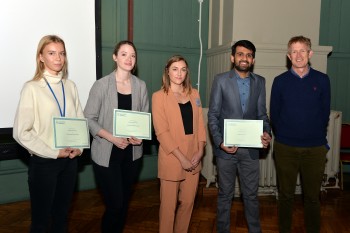 Award Winning Research Students in SEMS20 November 2019At the SEMS annual research led Industrial Liaison Forum, there was a research showcase from 80 of our current PhD students. The panel of judges this year were made up a wide range of academics from each division. They decided after a careful deliberation to award the following prizes: 1st Prize: … [more] | ||
October 2019 | ||
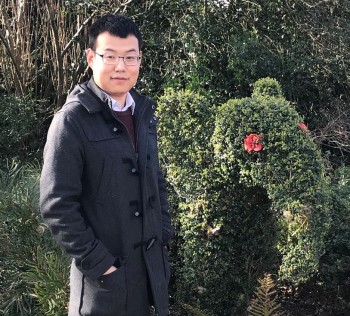 Congratulations to Su Fu who passed his PhD on the effect of mechanical forces on cartilage inflammation22 October 2019Su Fu has passed his PhD entitled: 'The role of primary cilia in the anti-inflammatory effects of mechanical loading in cartilage'. Su was supervised by Prof Martin Knight and funded by a grant from the China Scholarship Council. He has already published one very good paper in the journal Osteoarthritis … [more] | ||
September 2019 | ||
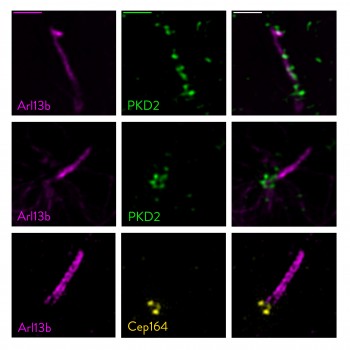 New research published in Nature Communications, reveals how the location of the protein Polycystin-2 (PC2) on primary cilia regulates Polycystic Kidney Disease.16 September 2019Autosomal Dominant Polycystic Kidney Disease (ADPKD) is a common yet devastating disease. It is a heritable disorder characterised by development of kidney cysts which slowly overtake the kidney’s structure, destroying its function, and often resulting complete kidney failure by the of age 60. ADPKD affects as many as 1 in 400 … [more] | ||
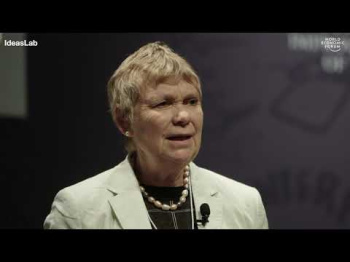 Bioengineers and Cancer Biologists develop a complex in vitro model of the human tumour - new Ideaslab video6 September 2019Bioengineers are trying to grow human organs, so could growing human tumours help us to understand the microenvironment in which they spread – and how the immune system might be persuaded to attack them? Frances Balkwill explains in this new Ideaslab video for the World Economic Forum how our research … [more] | ||
June 2019 | ||
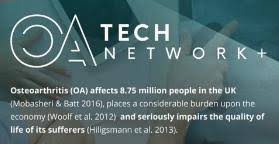 Funding awarded for mechanobiology research into osteoarthritis10 June 2019Queen Mary Researchers have been awarded funding for three separate biomechanics and mechanobiology pump priming projects. Professors Hazel Screen and David Lee of the School of Engineering and Materials Science were awarded funding from the OAtech+ Network to develop projects relating to mechanobiology aimed at targeting the chronic, degenerative disease … [more] | ||
May 2019 | ||
 Our paper on the role of tissue biomechanics in cancer development accepted at the journal Cancers17 May 2019Our paper entitled 'Transglutaminase-2 Mediates the Biomechanical Properties of the Colorectal Cancer Tissue Microenvironment that Contribute to Disease Progression' has been accepted in the journal Cancers. This paper was led by Dr Nick Peake and funded by our grant from Bowel & Cancer Research. Biomechanics analysis was provided by my PDRA, … [more] | ||
April 2019 | ||
 QM hosts Organ-on-a-chip Technologies Network meeting9 April 2019Queen Mary hosted the UK Organ-on-a-chip Technologies Network for a special Learning and Collaborative Event. The network has over 450 members from 50+ academic institutions with over 50 partners from industry and other stake holders. The network event included a programme of research talks, discussion groups, industry demonstrations and special training sessions on … [more] | ||
March 2019 | ||
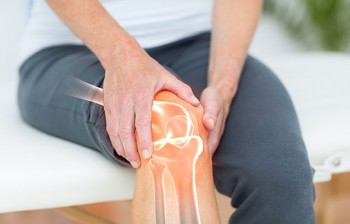 Exercise helps prevent cartilage damage caused by arthritis27 March 2019Exercise helps to prevent the degradation of cartilage caused by osteoarthritis, according to a new study from Queen Mary University of London. The researchers show for the first time how mechanical forces experienced by cells in joints during exercise prevent cartilage degradation by suppressing the action of inflammatory molecules which … [more] | ||
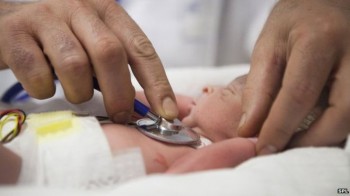 New research identifies optimal ventilation protocol for premature babies26 March 2019A new paper from Prof Martin Knight's group examines the use of two different methods of providing mechanical ventilation to premature babies. The study led by Prof Anne Greenough and colleagues at King's College London, explores the effect of lung inflation volume on inflammation within the alveolar epithelial … [more] | ||
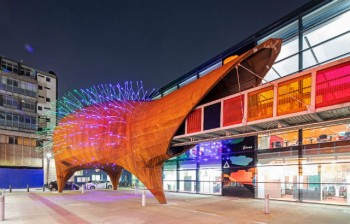 Giant ‘nerve cell’ science education centre lands in London’s East End4 March 2019‘Neuron Pod’ - a striking 23-metre long and 10-metre high free-standing structure – has opened its doors as an informal science learning centre at Queen Mary University of London’s Whitechapel campus. The launch was marked by a visit from children from Christ Church Primary School, Brick … [more] | ||
September 2018 | ||
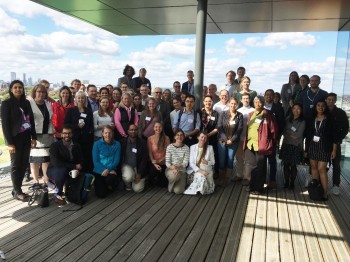 Organ-on-a-Chip Network launch a great success13 September 2018The UK Organ-on-a-Chip Network official launch took place last week. On the 6th of September there was a conference day, held in conjunction with the BioMedEng18 Conference, taking place at Imperial College London and followed by a launch day at Queen Mary’s Graduate Centre on Friday the 7th. … [more] | ||
July 2018 | ||
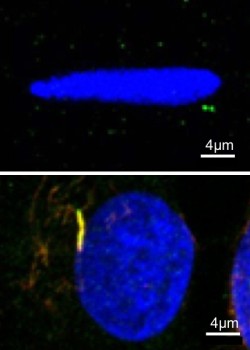 Mechanical regulation of primary cilia in tendon cells suggests a novel feedback mechanism controlling tendon health and mechanosensitivity.23 July 2018New research from Prof Martin Knight and Prof Hazel Screen's group at Queen Mary University of London reveals a novel feedback mechanism regulating tendon health and homeostasis during mechanical loading. The study published in Scientific Reports investigates primary cilia in tendon cells subject to physiological and pathological mechanical loading. … [more] | ||
June 2018 | ||
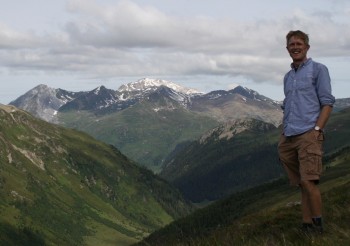 European Cells and Materials (eCM) Conference28 June 2018I attended the excellent eCM Cartilage conference in Davos Switzerland and presented Su Fu's PhD work on the role of primary cilia in the anti-inflammatory effects of mechanical loading. Lots of interesting talks. Also managed to get in some walking high in the Alps! [more] | ||
April 2018 | ||
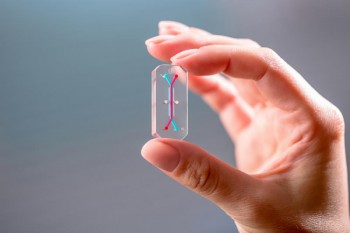 Queen Mary Awarded Funding to Establish Organ-on-a-Chip UK Network16 April 2018Queen Mary University of London has been awarded funding to lead a UK network in the development of ‘Organ-on-a-chip’ devices. The network will be part of a major new Research Councils UK (RCUK) funding venture, Technology Touching Life [1], which aims to foster interdisciplinary research into innovative technology in … [more] | ||
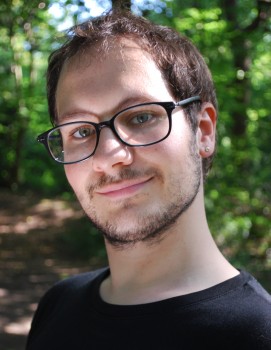 Dan Rowson passes his PhD on the effect of mechanical loading on tendon cells11 April 2018Congratulations to Dan Rowson who passed his PhD viva. Dan's PhD thesis investigated the effect of mechanical stimulation on tendon cells in order to better understand the process of tendon injury. In particular, Dan investigated the effect of mechanical forces on tiny hair-like cellular structures structures, known as primary … [more] | ||
March 2018 | ||
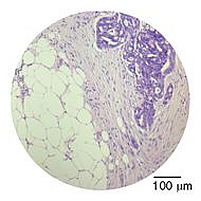 Exciting New Paper on the Tumour Microenvironment20 March 2018A new paper published in the journal Cancer Discovery, by Prof Martin Knight and colleagues describes, for the first time, an evolving human metastatic microenvironment. The work led by Prof Fran Balkwill measures gene expression, matrisome proteomics, cytokine and chemokine levels, cellularity, extracellular matrix organization, and relates this to changes … [more] | ||
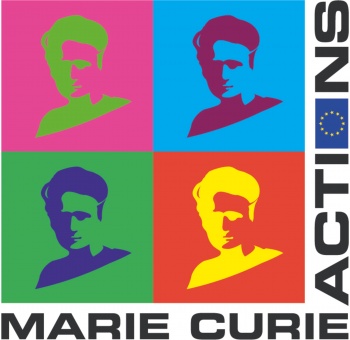 Marie Curie Fellowship Award for Dr Luming Zhao12 March 2018Congratulations to Dr Luming Zhao, who has been awarded a two-year H2020 Marie Curie Fellowship (€200k), supervised by Dr Lei Su, Prof Martin Knight and Dr Manoj Ramachandran. He will develop novel compact optical fibre lasers for clinical imaging and laser surgery. [more] | ||
February 2018 | ||
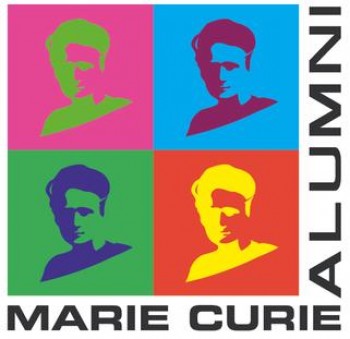 New grant on mechanobiology of bone tumours1 February 2018Dr Stefaan Verbruggen has recently joined the bioengineering group at Queen Mary on a Marie Sklodowska-Curie Actions Individual Fellowship. Stefaan is working in Prof Martin Knight's research group investigating the role of mechanical forces in bone cancer and the involvement of primary cilia. Stefaan's project is entitled 'META-DORM: … [more] | ||
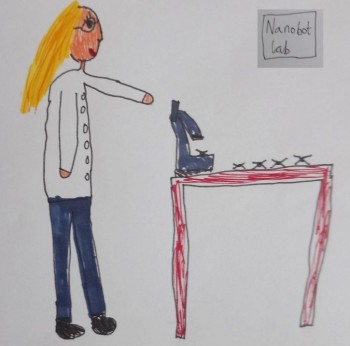 Fake a knee at the Science Museum1 February 2018When we loose cartilage tissue in the knee joint and suffer from knee pain, the joint function is impaired and the patient may need a total knee replacement surgery. The procedure involves removal of the damaged and diseased joint and replacement with an artificial joint. Most patients who undergo knee … [more] | ||
January 2018 | ||
Invited talk at Back2Back meeting16 January 2018Prof Martin Knight presented an invited talk at a special primary cilia session at the Back2Back meeting organised by Prof Sally Roberts. This excellent research meeting at the Robert Jones & Agnus Hunt Orthopaedic Hospital in Oswestry focused on back pain and intervertebral disc with a special cilia afternoon session … [more] | ||
September 2017 | ||
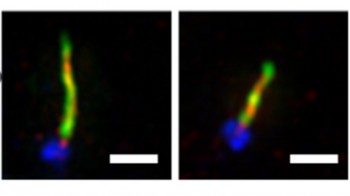 Study reveals how manipulation of primary cilia may improve cartilage tissue engineering30 September 2017A new paper from Prof Knight's group shows how expansion of cartilage cells for tissue engineering disrupts primary cilia expression inhibiting associated cellular signalling. Primary cilia are specialised, hair-like structures found singly in the majority of cell types where they coordinate a variety of cell processes important for tissue … [more] | ||
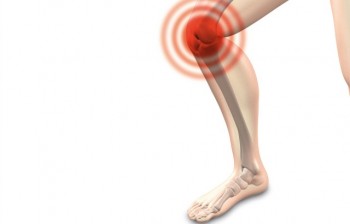 Research paper identifies the secret life of collagen12 September 2017Dr Gupta and Prof Knight have just published exciting results which cast light on how cartilage is able to withstand the demanding mechanical environment of the joint and may eventually help to explain why cartilage breaks down with ageing or arthritis. Collagen changes its crystallinity in response to physical forces, … [more] | ||
August 2017 | ||
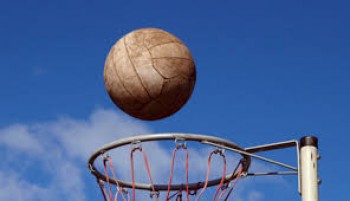 Research group netball match!28 August 2017Martin Knight's research group (and family!) took on Hazel Screen's research group (and extras) for a netball match. Despite heroic efforts from our team Hazel's group won (just)! | ||
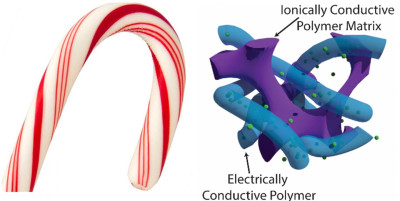 Candy cane supercapacitor could enable fast charging of mobile phones16 August 2017Supercapacitors promise recharging of phones and other devices in seconds and minutes as opposed to hours for batteries. But current technologies are not usually flexible, have insufficient capacities, and for many their performance quickly degrades with charging cycles. Researchers at Queen Mary University of London (QMUL) and the University of … [more] | ||
June 2017 | ||
Grant funding for iBSc Biomedical Engineering students1 June 2017Two students working in Prof Knight's research group received grant funding to continue their individual research projects over the summer. The two students have been doing research project as part of their Intercalated BSc in Biomedical Engineering and Clinical Materials. The funding from the Rod Flowers Scholarship scheme will enable … [more] | ||
April 2017 | ||
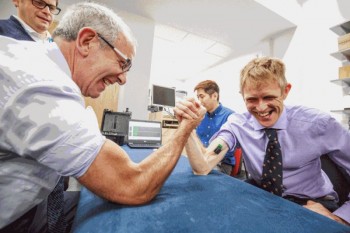 Wrestling with my supervisor!10 April 2017In November 2016, we celebrated 25 years since the start of the Interdisciplinary Research Centre (IRC) in Biomedical Materials at Queen Mary University of London. The IRC which was set up by Prof Bill Bonfield delivering high quality research including the development of bone graft substitute materials. Prof Knight was one of … [more] | ||
 Prof Knight presents invited lecture at BEAT PCD Meeting1 April 2017Prof Knight presented an invited lecture on super resolution microscopy at this meeting on Primary Cilia Dyskinesia in Valencia. I also had a fantastic bike ride down the coast to see flamingoes! | ||
March 2017 | ||
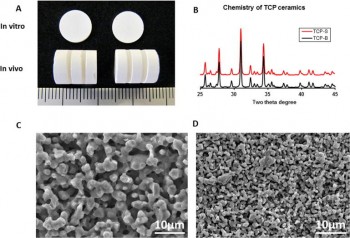 New study shows how novel biomaterial regulates primary cilia to control bone formation1 March 2017Prof Knight's group has published a new paper which shows how a novel bone graft substitute biomaterial promotes osteogenic differentiation of stem cells associated with regulation of primary cilia structure and TGFB signalling. The paper published in the journal Acta Biomateriala is based on the work of PhD student, Melis … [more] | ||
Other News
| UK Cilia Network meeting. Several members of the group attended this excellent meeting in Oxford. Sondos presented her 3rd year Biomedical Engineering research project on FGF and cilia, James and Su presented their PhD work looking at changes in cilia expression during chondrocyte passage and effect of mechanical loading on cilia mediated inflammatory signalling. (March 2017) | |||
EPSRC OAtech network plus - I have been appointed as the theme lead for Biomechanics and mechanobiology of OA and the relationship to clinical measurements. More information to follow. |
|||
|
|
|||
|
Two papers published on primary cilia in alkapatonuria - We have just had two papers published on changes in chondrocyte primary cilia structure and function in the rare genetic disease, alkaptonuria. These papers in Journal of Cellular Phsiology in collaboration with Prof Antucci (University of Sienna), show how alkaptonuria causes changes in primary cilia length, trafficking and proteome associated with disregulation of hedgehog signalling. Reduced Primary Cilia Length and Altered Arl13b Expression Are Associated with Deregulated Chondrocyte Hedgehog Signalling in Alkaptonuria. Stephen Thorpe et al. Smoothened-Antagonists Reverse Homogentisic Acid-Induced Alterations of Hedgehog Signalling and Primary Cilium Length in Alkaptonuria. Silvia Gambassi et al. |
|||
|
Bioengineering in Ireland23 - I attended the excellent Bioengineering in Ireland conference where I gave a keynote on mechanobiology and primary cilia. The conference has a really nice atmosphere with great presentations from post docs and PhD students and an awesome social program! |
|||
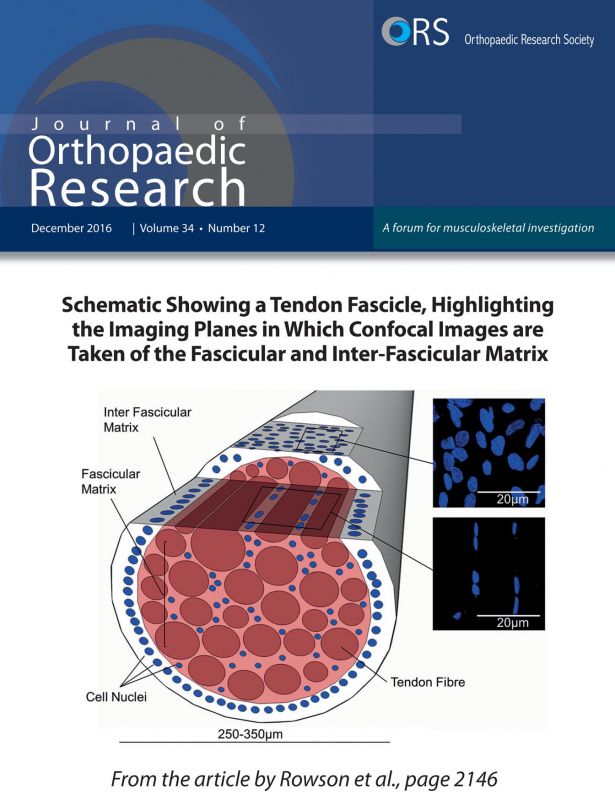 |
Dan Rowson's paper on cilia in tendon makes front page!- Dan's paper on tendon primary cilia and the effect of mechanical loading is featured on the front cover of the Journal of Orthopaedics Research. Click here to access the full paper.
|
||
| Royal College of Surgeons (RCS) Grant - Congratulations to Ahmed Ali who has been awarded a small grant from the RCS to work on a project in my group on primary cilia and osteoarthritis. Ahmed is currently studying for an intercalated BSc in Biomedical Engineering and Clinical Materials here at Queen Mary. The grant will support his individual research project on the interaction between mechanical loading and inflammation. (December 2016) | |||
|
|
|||
| Melis Dalbay passes her PhD - Congratulations to Dr Melis Dalbay who has passed her PhD. Melis worked on primary cilia in mesenchymal stem cells. In particular she has studied the effect of physical and chemical manipulation of primary cilia structure and how this influences adipogenic and osteogenic differentiation. She has already published one paper in the journal Stem Cells on IGF signalling in adipogenic differentiation with two further papers on the way. (November 2016) | |||
|
Cilia 2016 Conference - Several of the team attended the Cilia 2016 conference in Amsterdam. Clare Thompson presented some of exciting new data on the role of polycystin suggesting a new mechanisms of primary cilia mediated mechanosignalling. Melis Dalbay presented work from her PhD demonstrating biomaterial regulation of primary cilia elongation and how this control TGFB mediated osteogenic differentiation of mesenchymal stem cells. (October 2016)
|
|||
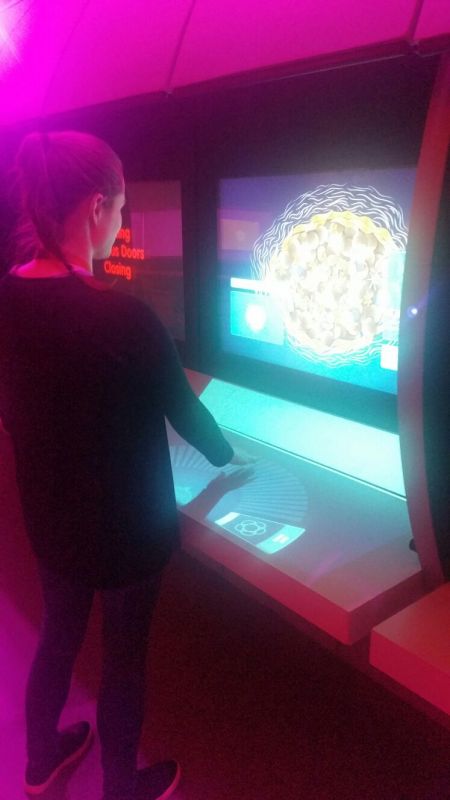 |
Our new public engagement Interactive goes live at the Centre of the Cell - Following the successful stand at the Royal Society Summer Exhibition, the online app has now been installed in the main pod at the Centre of the Cell (Queen Mary's interactive science centre). The interactive entitled 'tumour take down' is part of the CANBUILD project which aims to bioengineering a human tumour microenvironment. The Centre of the Cell also feature some of our other bioengineering interactives including Cartilage Bioengineering; Skin Tissue Engineering and Become a Medical Engineer. |
||
|
British Society for Matrix Biology (BSMB) meeting - 'The art of communication: Signalling cascades in mechanotransduction' (Cardiff, September). I presented a keynote lecture on some of our work looking at primary cilia mechanobiology. Dr Clare Thompson gave an excellent presentation on new data suggesting a totally new paradigm of primary cilia mediated mechanosignalling and Dr Rowson presented his latest PhD research on the effect of mechanical loading on tendon cell primary cilia.
|
|||
|
Research group away day joining up with Prof Hazel Screen's group for GoApe and Rounders!
|
|||
| The EU funded CanBuild project to bioengineer a human tumour has been presenting at the Royal Society Summer Exhibition this week. As part of the multidisciplinary team, I am working with post doc, Dr Robin Delaine-Smith, on understanding the role of biomechanics in regulating how the tumours grow and spread. See QM press release and write up in the Guardian. | |||
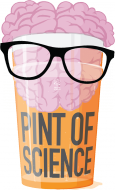 Pint of Science - I presented a public talk on my research as part of the Pint of Science festival on 23rd May at Redchurch Brewery! The talk in conjunction with Prof Julia Shelton, focussed on aspects of bioengineering related to the hip joint and the problem of arthritis which affects 8 million people in the UK. Full details at http://pintofscience.co.uk/event/from-hip-cells-to-implants Pint of Science - I presented a public talk on my research as part of the Pint of Science festival on 23rd May at Redchurch Brewery! The talk in conjunction with Prof Julia Shelton, focussed on aspects of bioengineering related to the hip joint and the problem of arthritis which affects 8 million people in the UK. Full details at http://pintofscience.co.uk/event/from-hip-cells-to-implants |
|||
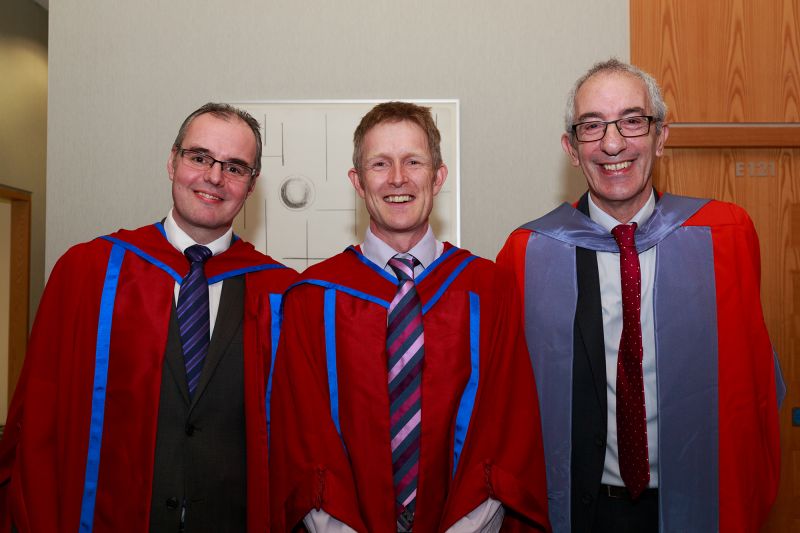 My Inaugural Lecture! - Mechanobiology and the Primary Cilium. Click here to see the full video and slides.
My Inaugural Lecture! - Mechanobiology and the Primary Cilium. Click here to see the full video and slides.
David Lee, Me and Dan Bader (David and Dan were my PhD supervisors at the IRC in Biomedical Materials, QMUL!
New biomechanics paper accepted: Experimental validation of a flat punch indentation methodology calibrated against unconfined compression tests for determination of soft tissue biomechanics RM Delaine-Smith, S Burney, FR Balkwill, MM Knight - Journal of the Mechanical Behaviour of Biological Materials. This work for this paper was done by Robin Delaine-Smith as part of the CANBUILD project funded by the ERC which aims to bioengineer a human tumour. The first stage of this process has been a full 'deconstruction' of the natural tumour microenvironment including biomechanics, proteomics and transcriptomics. The paper was also supported by an undergraduate medical engineering student, Saba Burney, who performed some of the biomechanical testing (February 2016)
And another one... Congratulations to Kristina and Zhao who's work on the effect of LifeAct-GFP on chondrocyte biomechanics and bleb formation has just been accepted for publication in the Journal of Biomechanics.
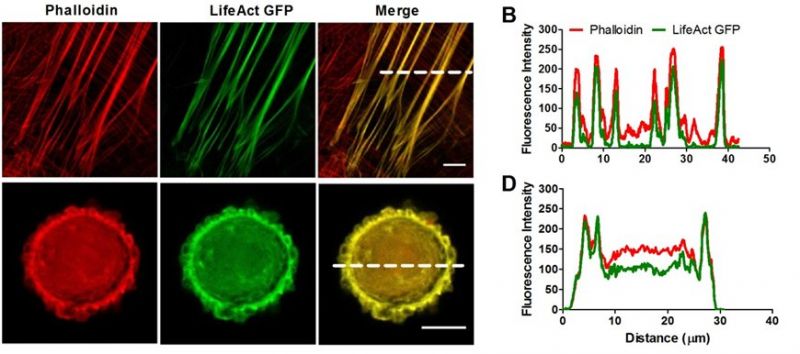
3 new journal papers accepted this week from my group:
- Clare L. Thompson; Riana Patel; Terri-Ann N. Kelly.; Angus K. T. Wann; Clark T. Hung; J. Paul Chapple; Martin M. Knight. Arthritis Research & Therapy. Hedgehog signalling does not stimulate cartilage catabolism and is inhibited by Interleukin-1β
- Kristina Sliogeryte; Lorenzo Botto; David A. Lee and Martin M. Knight. Osteoarthritis and Cartilage. Chondrocyte dedifferentiation increases cell stiffness by strengthening membrane-actin adhesion
- Tan A, VandenBerg C, Attur M, Abramson S, Knight MM, Bulinski J, Ateshian G, Cook JL, Hung C. Arthritis Research & Therapy 2015, 17 :361 (2015) Cytokine preconditioning of engineered cartilage provides protection against interleukin-1 insult
New Post Doc Position. There is a new post doc position currently being advertised to look at primary cilia electrophysiology using scanning ion conductance microscopy. The post is funded by the Wellcome Trust seed grant awarded to Dr Pavel Novak in the School of Engineering and Materials Science at QMUL. Application details here: https://webapps2.is.qmul.ac.uk/jobs/job.action?jobRef=QMUL7630 (December 2015)
Visit to Irish Cilia Network meeting and Trinity Centre for Bioengineering. I visited Dublin to give a seminar at the Trinity Centre for Bioengineering and then a keynote lecture at the Irish Cilia Network meeting. It was fantastic to meet David Hoey, Daniel Kelly, Oliver Blacque, Cairan Morrison, Catriona Lally and Paula Murphy and their research teams to hear about some of the great primary cilia research going on in Ireland and discuss opportunities for collaboration. (November 2015)
New PhD student, Su Fu , joins the group. We welcome Su Fu who joins my research group funded on a China Scholarship Council PhD project for 4 years. Su's project will examine the role of mechanically induced changes in primary cilia in regulating the inflammatory signalling cascade. Initial studies will focus on articular chondrocytes building on previous studies from our group. (More details) (November 2015).
Congratulations to Zhao Wang who passed his PhD viva. Zhao's PhD, which was funded via the China Scholarship Council, examined the influence of osmotic challenge on chondrocyte biomechanics. Zhao has already published two papers in the journal, 'OA and Cartilage' with a further paper currently in revision with the Journal of Biomechanics. The work involved micropipette aspiration for measurement of cellular mechanical properties coupled with confocal analysis of actin dynamics using LifeACT-GFP (see images below). (November 2015)

Media coverage following our latest paper on the effects of lithium on cilia and hedgehog signalling. Clare Thompson's paper from our group was published in FASEB J and shows how lithium chloride causes elongation of the primary cilia which results in reduced sensitivity of the hedgehog signalling pathway. The findings demonstrate exciting potential of ciliotherapy in which the structure of the cilium is modulated to control hedgehog signalling which is involved in osteoarthrititis and other pathologies. see press release and subsequent media coverage including Science Newsline, Follow News and Digital News World (November 2014)
Sheetal Inamdar wins poster prize at Institute of Bioengineering Launch Event. Sheetal won the prize for her poster describing her PhD research on the nanomechanics of collagen fibrils within cartilage and the effect of disruption of the chondrocyte primary cilia. The Institute of Bioengineering launch (photo below) was attended by over 200 people who came to mark the launch of this ambitious cross-Faculty initiative and to hear about QMUL’s diverse scientific research portfolio in bioengineering. (October 2015)
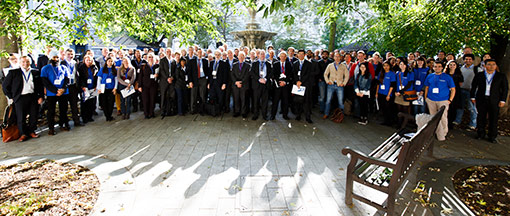
Wellcome Trust Seed Award funded. “Mapping mechanotransduction mediated by primary cilia at nanoscale “. This grant awarded to Dr Pavel Novak will combine the latest technology in scanning probe microscopy and nanopipette techniques with confocal microscopy, electrophysiology, and mechano-biology to break the existing resolution barrier in direct stimulation and recording of channel and receptor activity along the fine structure of primary cilia. The technique will be used to gather data on the distribution of mechano-chemical receptors in primary cilia to support future research proposals aimed at understanding the reorganisation of mechanotransduction in ciliated cells in disease. I am the named collaborator on this grant which supports the groups work on cilia structure-function relationships. (September 2015)
Paper published on chondro-protective effects of lithium. Our paper was published in Journal of Orthopaedic Research describing how dietry lithium chloride is not catabolic in vivo and also prevents the degradation of articular cartilage in response to the inflammatory cytokine, IL-1B. The work was led by Dr Clare Thompson with support from two Medical Engineering undergraduate students (Anna Verone and Habiba Jasmin) with grant funding from the AO Foundation in collaboration with Prof Tony Poole in New Zealand. The paper has attracted some media interest following a QM press release

Cynthia Jensen visits from Auckland, New Zealand. We were delighted to have Prof Cynthia Jensen visit our group. Cynthia was involved in much of the pioneering work on primary cilia in connective tissue and hosted my previous research visits to University of Auckland in 1998 and 2006. While Cynthia was visitng us in we had talks from some of the cilia research team (from left: Me, Dan Rowson, Sheetal Inamdar, Melis Dalbay, Robin Delaine-Smith, Riana Patel and Cynthia Jensen). (July 2015)

I love Super Resolution microscopy of primary cilia! Just had a lovely time taking images of primary cilia in human chondrocytes. The following image obtained using structural illumination with 3D reconstruction - red is acetylated a-tubulin, green is pericentrin. This primary cilia has a length of approximately 2 microns. (June 2015)
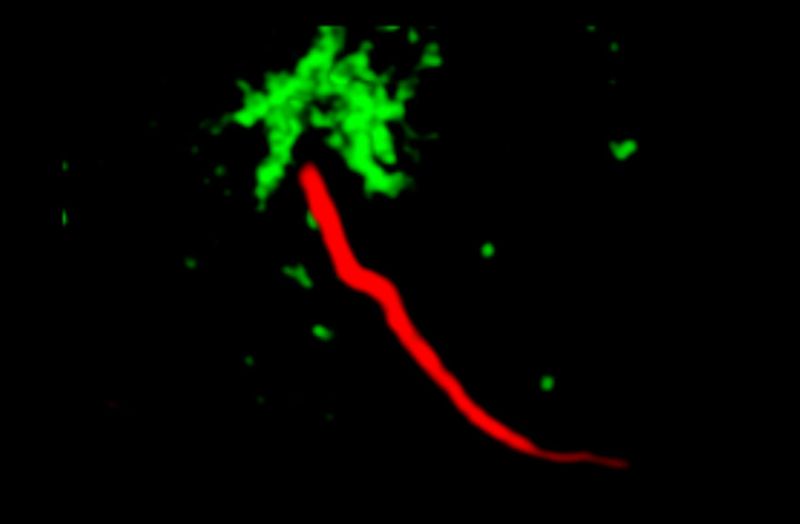
Silvia Gambassi joins our group to examine the role of primary cilia alkaptonuria. Silvia is a visiting PhD student from Prof Annalisa Santucci's lab in the University of Sienna, Italy. Her work is investigating whether cartilage degeneration in alkaptonuria involves changes in primary cilia structure and function. She has recently taken this lovely confocal image of primary cilia in human chondrocytes with acetylated a-tubulin (red) and pericentrin (green).
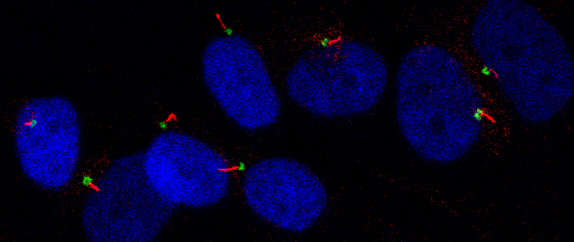
Riana Patel wins Rod Flower Scholarship. Riana is a medical student doing an intercallated BSc in Biomedical Engineering at Queen Mary and has been working on her research project investigating the role of hedgehog signalling in cartilage pathology.The scholarship will allow Riana to work through the summer on a new project examine the role of de-differentiation on chondrocyte primary cilia. (April 2015)
Interview in EngineeringBecause. I was recently interviewed for the website Engineering Because about my career in medical engineering and mechanobiology. click here to see full article (April 2015)
Royal Society Mechanobiology meeting. I presented some of our research at this small invited research meeting. The programme included presentations from Don Ingber, Matt Dalby and Denis Discher's lab (April 2015)
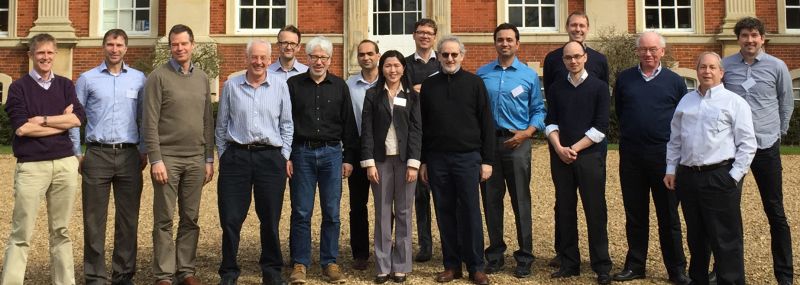
New Cancer Biomechanics pump priming grant from QM Life Sciences Inistitute. The grant is entitled 'Characterising the therapeutic impact of immunoglobulins on tumour biomechanics' and is in collaboration with Dr Melania Capasso at Barts Cancer Institute. (April 2015)
New grant awarded by Bowel & Cancer Research. The grant, led by Dr Nick Peake (SEMS) and in collaboration with Dr Alex Mirnezami at the University of Southampton, will study the role of biomechanics in the progression of colon cancer. More details. (March 2015)
Congratulations to Kristina Sliogeryte who passed her PhD. Her project, supervised is entitled: 'The role of membrane-actin adhesion in regulating stem cell viscoelastic properties and blebability during differentiation?' (17th March 2015)
Launch of the new Primary Cilia research group web site. We have launched a new web site bringing together primary cilia research taking place at Queen Mary University of London. http://www.primarycilia.qmul.ac.uk/
Undergraduate 'Best Project Prizes' - My 3rd year Medical Engineering undergraduate student, Shyam Patel, won the prize for the best research project at the recent Industrial Affiliates Forum hosted by the School of Engineering and Materials Science. Shyam's project examines the effect of enzymatic degradation on the local strain fields and mechanical properties in articular cartilage. The project links with PhD student, Sheetal Inamdar, who is working with me and Dr Himadri Gupta on cartilage collagen nanomechanics assessed using small angle x-ray defraction.
My 4th year Medical Engineering group R&D project also won the best 4th year project prize for their work on testing of a novel vascular graft in collaboration with an industrial sponsor. (March 2015)
Cilia elongation controls stem cell adipogenesis - Paper published in Stem Cells. Our paper has just been published showing the adipogenic differentiation of human mesenchymal stem cells is mediated by primary cilia elongation and associated recruitment of insulin-like growth factor receptor (IGF-R) to the primary cilium. The paper is part of Melis Dalbay's PhD studies on the role of primary cilia in stem cell differentiation. Click here for full paper. See QMUL Press Release and associated write up in Science Daily, BioPharma-Reporter, diabetes.co.uk and MF Monitor (February 2015)
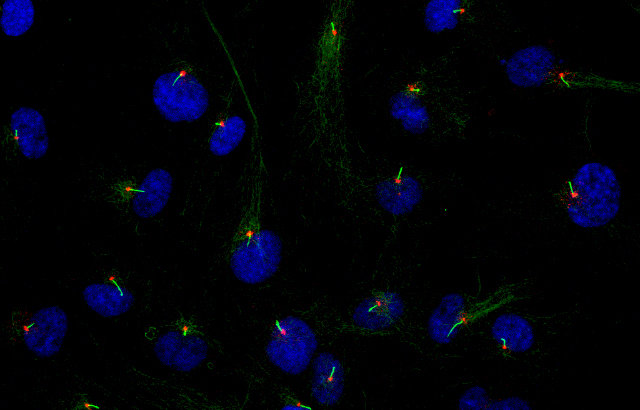
New PhD Studentships. I am currently advertising for a new PhD student to work on the role of polycystin in cartilage mechanobiology in health, aging and disease. The student will be trained in state-of-the-art techniques including super resolution microscopy and scanning ion conductance microscopy (SICM) enabling nanoscale visualisation of polycystin on primary cilia and electrophysiology of this possible mechanosensitive ion channel. This exciting new project will be co-supervised by Dr Pavel Novak (an expert on SICM) and Dr Cleo Bishop in the School of Medicine and Dentistry (an expert in primary cilia and ageing). [More infomation] (January 2015)
Our paper on cell mechanics and osmotic challenge published in OA and Cart. Congratulations to Zhao Wang as his paper has just been published in OA and Cart. The study examined the influence of rate of hypoosmotic challenge on chondrocyte morphology, actin organisation and regulatory volume decrease. The study used micropipette aspiration to reveal how these factors induced changes in cellular mechanics. click here to view the paper (valid until 11th March)
Our Bionic Man interactive on the BBC. The BBC news recently ran a report on the skills gap in engineering and science and the need to encourage more students to study engineering at university. The BBC report showed a nice image of our 'Bionic Man' interactive that we have presented at various science festivals encourageing school children to consider careers in bioengineering. (January 2015)
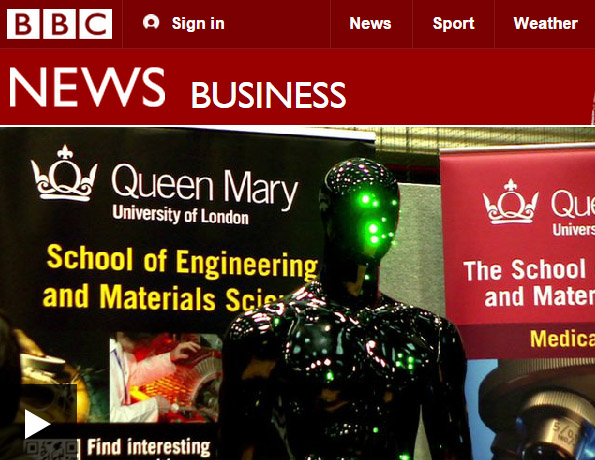
Farewell to Angus. After six years as a post doc in my group, Dr Angus Wann is leaving to take up a personal Fellowship at the Kennedy Institute in Oxford. Angus is an outstanding scientist who has made a major contribution to the success of our group and the field of primary cilia research. He has published some excellent papers and helped write three successful project grants. He has been an enthusiastic team player and we will all miss him greatly but I am sure the collaboration and friendship will continue. Good luck Angus! (December 2014)
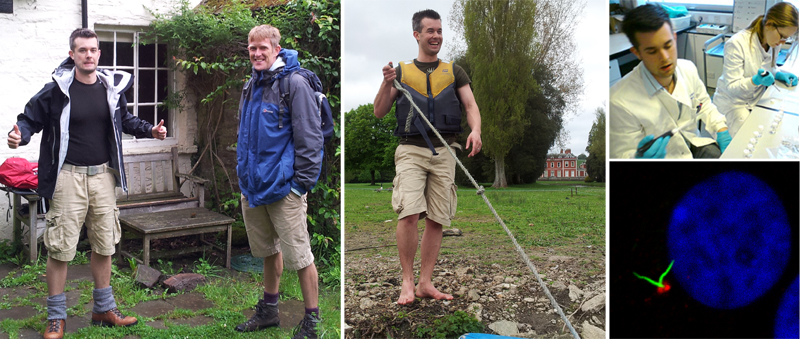
External Examiner Appointment. Prof Knight has recently been appointed as the external examiner for the Biomedical Engineering (BEng and MEng) undergraduate degree programmes at Imperial College, London. This degree programme at Imperial and the medical engineering programme at QMUL represent the two largest undergraduate bioengineering degree programmes in the UK. (December 2014)
Cilia 2014 Conference. Our group presented two abstracts at the Cilia 2014 meeting in Paris. Melis Dalbay gave an excellent oral presentation on the role of primary cilia elongation in adipogenic differentiation. Dr Clare Thompson presented some of her latest data on the effect of lithium on primary cilia structure and hedgehog signalling in chondrocytes. Click here for full programme. (November 2014).
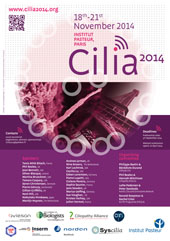
First Super Resolution Microscopy images of Primary Cilia. We were excited to take our first images of primary cilia using the new super resolution microscope purchased by the Institute of Bioengineering. The images (below) were captured using structural illumination microscopy (SIM) and show the location of ARL13b (green) around the perifery of the primary cilium (red - acetylated alpha tubulin). To our knowledge this is the first time that ARL13b has been imaged with sufficient resolution to suggest its membrane location (October 2014).

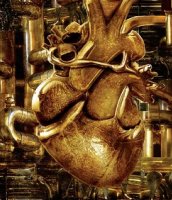
Holidays - Happy memories of the French Alps!

F1000 prize for work on primary cilia length and hedgehog signalling. ClareThompson's work on the relationship between chondrocyte primary cilia length and hedgehog signalling won the F1000 prize based on the poster which I presented at the eCM conference ‘Cartilage & Disc: Repair and Regeneration’. More details here. (July 2014)
Bioengineering the Bionic Man. Martin gave a public presentation at the Barts and Queen Mary Science Fair describing some of the bioengineering research that his group and others are doing to help treat medical problems such as meniscal tears, ruptured ligaments and arthrtitis. (July 2014)
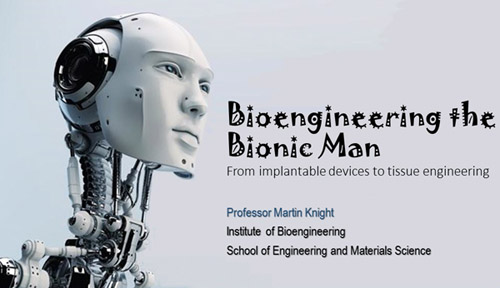
Martin presents at eCM conference. We had three posters and an oral presentation at the cartilage repair meeting in Davos, Switzerland. I presented our work on chondrocyte dedifferentiation and changes in primary cilia and hedghog signalling as well as two posters on the effects of lithium on cilia and cartilage degradation and one on the role of cilia in IL1 NFkB signalling. Thanks to Angus and Clare who have done much of this work funded through grants from the ARUK and AO Foundation.
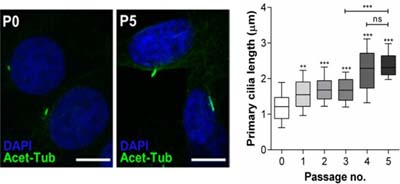
I also got to spend some time walking in the fantastic Swiss Alps. (June 2014)

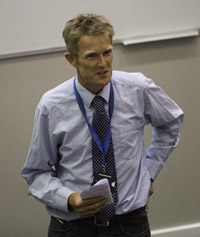 Martin chairs Biomaterials session at Prof Priestley's retirement symposium. I attended the symposium for Prof John Priestley who is retiring from QMUL. He and I have collaborated on neural mechanobiology and we jointly supervised, along with Prof Adina Michael-Titus, an excellent BBSRC PhD student (Stacy Gladman).
Martin chairs Biomaterials session at Prof Priestley's retirement symposium. I attended the symposium for Prof John Priestley who is retiring from QMUL. He and I have collaborated on neural mechanobiology and we jointly supervised, along with Prof Adina Michael-Titus, an excellent BBSRC PhD student (Stacy Gladman).
(June 2014)
Medical Engineering prize - student blog. Anna Varone has written a nice blog on the QMUL website describing how she won the IMechE prize for best medical engineering student project. Her project (part of her undergraduate degree in Medical Engineering) looked at the effect of lithium on cartilage degradation in the presence of inflammatory cytokines. The work is part of a grant from the AO Foundation in collaboration with Prof Tony Poole and with Dr Clare Thompson as the post doc. We will present this at the ECM Cartilage meeting next week and hope to submit as a full journal paper shortly. Anna is off to Aberdeen to start a PhD linked with Oxford Biomaterials and working on silk conduits for neuro-regeneration. (June 2014)

Research Group Away Day We joined with Dr Hazel Screen's research group for an away day to Box Hill in Surrey. Excellent picnic and rounders but poor Zhao painfully dislocated his shoulder in an epic attempt to win the relay race for team Knight. Fortunately he is now recovering well. (June 2014)

New primary cilia paper published. Our paper on the role of the primary cilium in NFKB signalling induced by IL-1 has been published in Journal of Cellular Signalling. Dr Angus Wann conducted the research as part of his post doc funded by a grant from the ARUK. (May 2014)
Urine Superpowers documentary wins award Last year I was filmed as part of a documentary on urine. This followed my paper on fluid mechanics analysis of the spiral pattern made by urine as it leaves the eliptical shaped male urethra and its potential diagnostic use (PLOSone 2012). The documetary has recently won an award (Le Trophy d'Or) and will soon be shown on French TV. (May 2014)
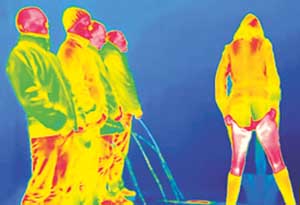
Four abstracts accepted at ECM Cartilage conference. Delighted to hear we have three posters and one oral presentation at the forthcoming European Cells and Materials conference on Cartilage Repair in Davos, Switzerland. The papers relate to the primary cilia work of Dr Angus Wann and Dr Clare Thompson and also a nice study on the chondroprotective nature of lithium chloride in collaboration with Tony Poole. (April 2014)
Our new Cilia paper published in Journal of Cellular Signalling. Dr Angus Wann has just published his paper entitled: The primary cilium influences interleukin-1β-induced NFκB signalling by regulating IKK activity. The paper stems from studies funded by our ARUK grant on the role of cilia in inflammatory arthritis. (April 2014)
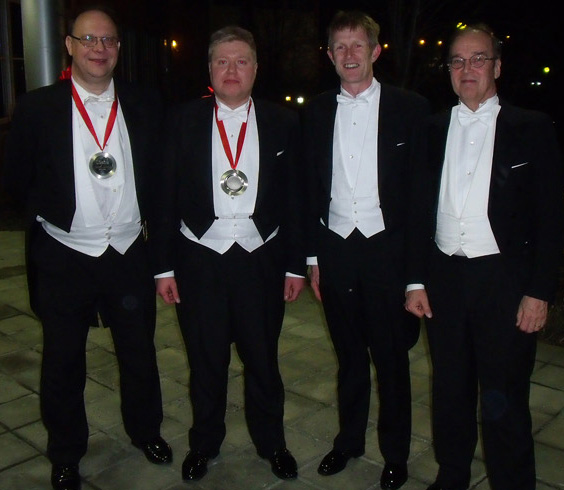 Visit to Finland for PhD viva. I visited Finland to be the official opposer for Hannu Karjalainen's PhD defence at the University of Eastern Finland, Kuopio. Hannu (2nd from left) was supervised by Prof Mikko Lammi (left) and his thesis was entitled: 'Transcriptional Responses of Chondrocytic and Osteoblastic Cells to Physical Forces of Hydrostatic and Osmotic Pressure, Mechanical Stretching, and Low Intensity Pulsed Ultrasound'. Whilst there I was treated extremely well including a chance at ice hole fishing and a drive over the frozen lake (pictured) as well as the fantastic 'after party' (February 2014)
Visit to Finland for PhD viva. I visited Finland to be the official opposer for Hannu Karjalainen's PhD defence at the University of Eastern Finland, Kuopio. Hannu (2nd from left) was supervised by Prof Mikko Lammi (left) and his thesis was entitled: 'Transcriptional Responses of Chondrocytic and Osteoblastic Cells to Physical Forces of Hydrostatic and Osmotic Pressure, Mechanical Stretching, and Low Intensity Pulsed Ultrasound'. Whilst there I was treated extremely well including a chance at ice hole fishing and a drive over the frozen lake (pictured) as well as the fantastic 'after party' (February 2014)

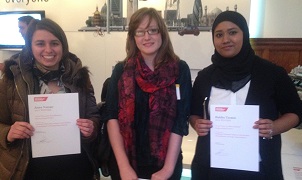 IMechE Best Medical Engineering student project prize Two undergraduate medical engineering students working in my group, Anna Varone and Habiba Yasmin, won the Vicon prize for the best Medical Engineering project at the 26th annual biomedical engineering student project competition organised by the Institute of Mechanical Engineers. Their projects have examined the effect of lithium chloride on the cartilage degradation in the presence of the inflammatory cytokine IL-1B. The pair are supervised by me but have also had great support from Dr Clare Thompson, who is a post doc on our AO Foundation grant looking at the effect of lithium on cartilage and primary cilia. (February 2014)
IMechE Best Medical Engineering student project prize Two undergraduate medical engineering students working in my group, Anna Varone and Habiba Yasmin, won the Vicon prize for the best Medical Engineering project at the 26th annual biomedical engineering student project competition organised by the Institute of Mechanical Engineers. Their projects have examined the effect of lithium chloride on the cartilage degradation in the presence of the inflammatory cytokine IL-1B. The pair are supervised by me but have also had great support from Dr Clare Thompson, who is a post doc on our AO Foundation grant looking at the effect of lithium on cartilage and primary cilia. (February 2014)
 Three posters at the Keystone Symposia on Cilia. Dr Angus Wann, Dr Clare Thompson and Melis Dalbay will all be presenting some of their latest research at the prostigeous internation Keystone Sympoisa on Cilia, Development and Human Disease being held in Calafornia. (February 2014)
Three posters at the Keystone Symposia on Cilia. Dr Angus Wann, Dr Clare Thompson and Melis Dalbay will all be presenting some of their latest research at the prostigeous internation Keystone Sympoisa on Cilia, Development and Human Disease being held in Calafornia. (February 2014)
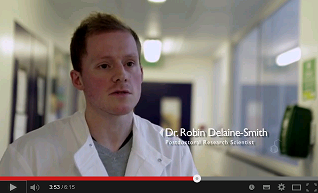 New QM research film on the CANBUILD grant. The college has produced a new short film highlighting the research taking place in the CANBUILD project funded by an ERC grant awarded to Prof Balkwill. The aim of the project is to engineer a human tumor microenvironment in vitro. Dr Robin Delaine-Smith is the post doc in my group working on measuring the biomechanics of omental tumours with a view to using the mechanical properties to drive tumorogenesis. (January 2014)
New QM research film on the CANBUILD grant. The college has produced a new short film highlighting the research taking place in the CANBUILD project funded by an ERC grant awarded to Prof Balkwill. The aim of the project is to engineer a human tumor microenvironment in vitro. Dr Robin Delaine-Smith is the post doc in my group working on measuring the biomechanics of omental tumours with a view to using the mechanical properties to drive tumorogenesis. (January 2014)
Watch the film on youtube: http://www.youtube.com/watch?v=V61eD9oJD48
Cilia paper accepted in Osteoarthritis and Cartilage. The paper is based on Clare Thompson's PhD research and examines the influence of mechanical loading on primary cilia structure and associated hedgehog signalling. (January 2014)
 Media coverage following our paper on cilia and topography induced differentiation. Following publication of Rebecca McMurrey's paper in Scientific Reports, Queen Mary issued a press release which led to a write up in The Scientist Magazine - Surface Texture Influences Differentiation . (December 2013)
Media coverage following our paper on cilia and topography induced differentiation. Following publication of Rebecca McMurrey's paper in Scientific Reports, Queen Mary issued a press release which led to a write up in The Scientist Magazine - Surface Texture Influences Differentiation . (December 2013)
Christmas Party and Sports. The Knight research group joined up with Dr Hazel Screen's group for a rather strange sporting event - Netball/hangman - which required a combination of physical and mental dexterity! This was followed by Christmas Dinner which required neither. (December 2013)
Three new primary cilia journal papers accepted from the group.The Knight research group have just had three new primary cilia journal papers accepted for publication. The first study from Dr Angus Wann is to be published in the journal Cilia and demonstrates the interaction of HIF signalling and primary cilia in response to inflammatory cytokines. Dr Jerome Irianto in collaboration with Prof Rosa Serra, had his paper accepted by Journal of Biomechanics on the effect of depletion of primary cilia on the mechanical properties of cartilage. Finally Dr Rebecca McMurrey, Dr Angus Wann and Dr Clare Thompson have had a paper accepted in Scientific Reports. Their study unravelled the role of primary cilia elongation in mediating stem cell wnt signalling and differentiation in response to micro grooved topography. (December 2013).
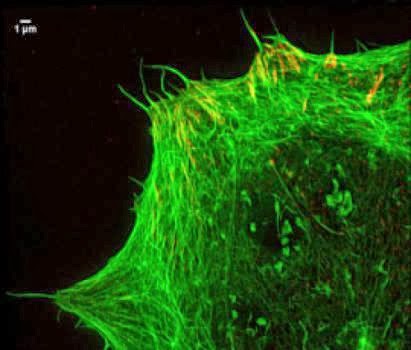 Our paper on development of a spinning-disk super resolution microscope published in PlosOne. Dr Neveen Hosny has published our paper on the development of a super resolution microscope system that she built during her post doc position in my group funded by an EPSRC discipline bridging grant in collaboration with Dr Ann Wheeler. The paper in Plos One and the associated Queen Mary press release has been picked up by various science websites and is to be written into a full article for The Biologist magazine. (October 2013). http://www.qmul.ac.uk/media/news/items/se/115135.html
Our paper on development of a spinning-disk super resolution microscope published in PlosOne. Dr Neveen Hosny has published our paper on the development of a super resolution microscope system that she built during her post doc position in my group funded by an EPSRC discipline bridging grant in collaboration with Dr Ann Wheeler. The paper in Plos One and the associated Queen Mary press release has been picked up by various science websites and is to be written into a full article for The Biologist magazine. (October 2013). http://www.qmul.ac.uk/media/news/items/se/115135.html
Our paper has been published on why cat urine doesn't cause encrustation of urological stents. Recent research from MSc Bioengineering student, Manar Shafat, has just been published exploring the difference between cat urine and human urine in terms of the rate of encrustation of urological stents. Manar's work showed that the differences in the inorganic chemical composition of human and cat urine is not responsible for the difference in encrustation suggesting it is the different organic components that prevent encrustation in cats. See full news report: 'Can eating Cat food cause urinary problems'
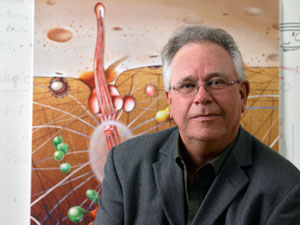 Dr Tony Poole visits and speaks at London Cilia meeting. Tony Poole from University of Otago (New Zealand), one of our long standing collaborators, visited our group on 2nd October and spoke at a meeting on primary cilia researcher that we organised here at Queen Mary. The meeting included Prof Cheetam (UCL Institute of Opthalmology), Dr Mittchinson & Prof Phil Beales (UCL Institute of Child Health), Dr Paul Chapple (QMUL WIlliam Harvey Research Institute) and members of these groups. (October 2013).
Dr Tony Poole visits and speaks at London Cilia meeting. Tony Poole from University of Otago (New Zealand), one of our long standing collaborators, visited our group on 2nd October and spoke at a meeting on primary cilia researcher that we organised here at Queen Mary. The meeting included Prof Cheetam (UCL Institute of Opthalmology), Dr Mittchinson & Prof Phil Beales (UCL Institute of Child Health), Dr Paul Chapple (QMUL WIlliam Harvey Research Institute) and members of these groups. (October 2013).
Clare Thompson passes her PhD viva. Many congratulations to Clare whos PhD examined the influence of mechanical and thermal stress on chondrocyte primary cilia and associated hedgehog signalling. Clare is continuing in the group as a post doc working on an AO Foundation grant looking at the effect of lithium on chondrocyte primary cilia and cartilage degradation. (September 2013).
MRC Grant Successful.  We now have confirmation that the MRC will fund our grant entitled: 'Osteoarthritis may be treated as an environmental ciliopathy'. The grant tests the hypothesis that pathological cues such as mechanical loading and inflammatory cytokines, modulate primary cilia structure and function leading to the onset and progression of arthritis. The grant is in collaboration with Prof Phil Beales and Dr Hannah Mitchinson (UCL) and Dr Paul Chapple (QMUL) and Mr Manoj Ramachandran (Barts & The London NHS). (September 2013)
We now have confirmation that the MRC will fund our grant entitled: 'Osteoarthritis may be treated as an environmental ciliopathy'. The grant tests the hypothesis that pathological cues such as mechanical loading and inflammatory cytokines, modulate primary cilia structure and function leading to the onset and progression of arthritis. The grant is in collaboration with Prof Phil Beales and Dr Hannah Mitchinson (UCL) and Dr Paul Chapple (QMUL) and Mr Manoj Ramachandran (Barts & The London NHS). (September 2013)
Melis Dalbay and Kristina Sliogeryte present posters at the 7th UK Mesenchymal Stem Cell Meeting. Melis presented her PhD research in a poster entitled 'The role of primary cilia elongation in human mesenchymal stem cell differentiation'. Kristina's poster was entitled 'Chondrogenic differentiation regulates cell mechanics and migration by strengthening the interaction between the cell membrane and cortical actin'. Steven Thorpe from our research group also attended the meeting. (September 2013)
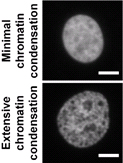 Jerome Irianto publishes a paper from his PhD describing a method for quantifying chromatin condensation from confocal microscopy images. Jerome, who is now doing a post doc in the USA, has had his paper accepted in Medical Engineering and Physics. The paper is entitled 'Quantification of Chromatin Condensation Level by Image Processing'. (September 2013)
Jerome Irianto publishes a paper from his PhD describing a method for quantifying chromatin condensation from confocal microscopy images. Jerome, who is now doing a post doc in the USA, has had his paper accepted in Medical Engineering and Physics. The paper is entitled 'Quantification of Chromatin Condensation Level by Image Processing'. (September 2013)
Clare Thompson wins prize for primary cilia presentation at the British Society for Matrix Biology (BSMB) meeting in Cardiff. Clare's presentation was entitled: 'Primary cilia disassembly down regulates mechanosensitive hedgehog signalling - a feedback mechanism controlling ADAMTS5 expression in chondrocytes'. The theme of the meeting was 'Under pressure: the cell's response' with presentations describing the response of cartilage, tendon and other tissues to mechanical loading. Prof Knight was also at the meeting along with Dr Angus Wann who presented a couple of posters on his primary cilia research. We all joined Dr Hazel Screen and some of her research group for a day walking in the Black Mountains. (September 2013)
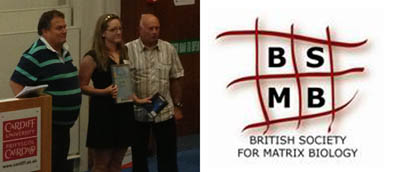
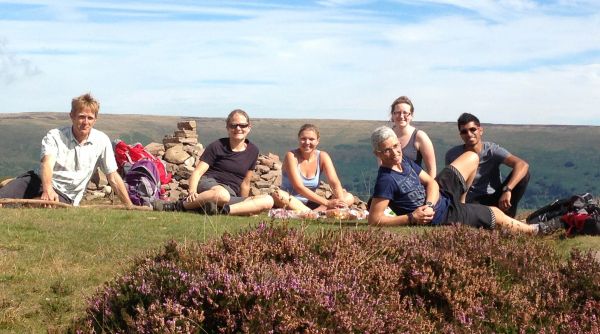
Priyanka Pravincumar (recent PhD graduate from the group) has got a post doc position at the AO foundation in Switzerland. Congratulations to Priyanka who's PhD thesis concerned the mechanical properties of chondrocytes and the role of actin dynamics. She published three nice papers in PLOSone, Biophysical Journal and Human Molecular Genetics. We look forward to visiting her in the Swiss Alps! (August 2013).
Research team wins at Rounders! Our research group joined up with Hazel Screen's group for an awayday picnic and rounders match in the Chilterns. We won the rounders but lost out in the relay race! All returned refreshed and a little sunburnt. (July 2013)
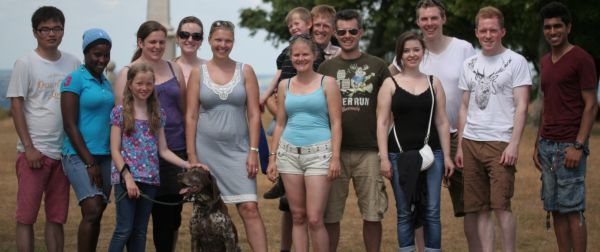
Robin Delain-Smith joins the group. 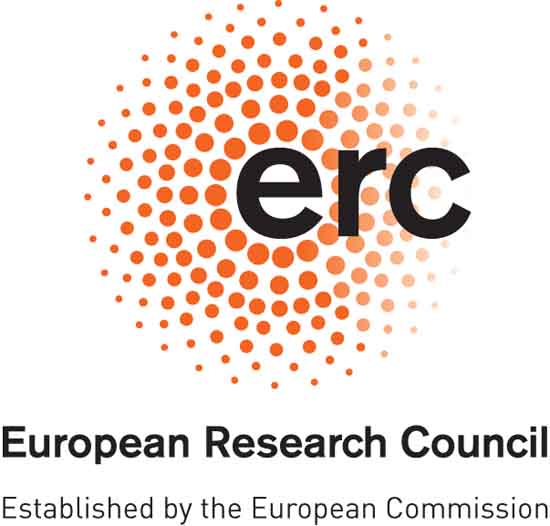 Robin is part of the CANBUILD project funded by an ERC grant to Prof Fran Balkwell. The project aims to develop an in vitro tumour micro environment using tissue engineering techniques. Robin will be involved in the mechanical characterisation of the natural tumour environment, providing data for the development of tissue engineered scaffolds. He will also be involved in examining the response of adipogenic and cancer stem cells within the engineered scaffolds. (July 2013)
Robin is part of the CANBUILD project funded by an ERC grant to Prof Fran Balkwell. The project aims to develop an in vitro tumour micro environment using tissue engineering techniques. Robin will be involved in the mechanical characterisation of the natural tumour environment, providing data for the development of tissue engineered scaffolds. He will also be involved in examining the response of adipogenic and cancer stem cells within the engineered scaffolds. (July 2013)
Clare Thompson Runner up in Poster Competition. Clare Thompson presented her PhD research at the William Harvey annual review at QMUL and was awarded the runner up prize for the poster competition. Her PhD research examines the influence of mechanical loading on chondrocyte primary cilia and hedgehog signalling and the implications for development of osteoarthritis. She is supervised by Martin Knight (SEMS) and Paul Chapple (William Harvey) and has just submitted her PhD thesis. (June 2013)
Farewell to Dr Jerome Irianto who leaves the group for a new post doc position in the USA. Jerome completed his MEng in Medical Engineering at QMUL and then went on to do a PhD supervised by Prof Knight and Prof Lee. He then continued his studies as a post doc working on the effect of osmotic and mechanical stimuli on nucleus chromatin condensation and cell mechanics. The group enjoyed a day out rowing at Henley on Thames as part of Jerome's farewell celebrations.
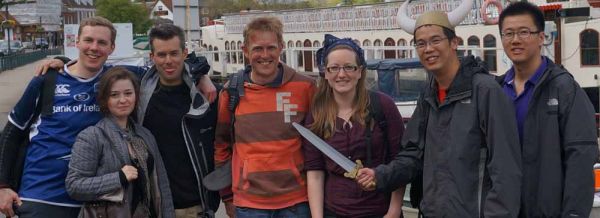
Research group outing - rowing at Henley on Thames. (May 2013)




